#because it’s not because he thinks the bad kids are monstrous in a metaphorical way
Text
grix is racist for using dominate monster actually
#d20#dimension 20#d20 spoilers#fhjy#d20 fantasy high#fantasy high#fantasy high junior year#dimension 20 fhjy#riz gukgak#because it’s not because he thinks the bad kids are monstrous in a metaphorical way#he saw a goblin and called him a monster
332 notes
·
View notes
Text
What does Jordan Peele’s three movies, “Get Out”, “Nope”, and “Us”, all have in common.
Over the past three weeks, I have taken a deep dive into the horror curriculum of Jordan Peele’s archive Get Out, Us, and Nope. “Get Out” is his first horror film that covers the uncomfortable topics people usually avoid at family gatherings. Identified Microaggressions, liberal racism, cultural appropriation, coveting of black bodies, white supremacy, mass incarceration, are the primary themes Chris, the protagonist is facing while his girlfriend, Rose the antagonist is intentionally putting on a facade for the fulfillment and legacy of her family. Jordan Peele allows us to put on the shoes of a black man and walk in his perspective for 2 hours. What we initially find is a black man questioning himself and his instincts and suppressing how he truly feels to be in compliance with his girlfriend's family. Sometimes we suffer in our sacrifices for the lust of someone else. Why? I think Jordan Peele answers this question in his sophomore film, Us. “Us”, is a film about a woman named Adelaide who once lived in Santa Barbara. Adelaide experienced some haunting traumas as a child as she visits her childhood home again as an adult she is terrified something bad will happen. What Adelade does not psychologically understand is that by suppressing her childhood traumas, during this trip, her traumas come back to deal with her. I think this is a really important message in the black community. Suppressing and sacrificing your emotional welfare for the lust of someone else. What her trauma ended up doing was cloning herself and coming after her. She thought because she suppressed it as a kid, it was gone, but what Peele I think is saying to the audience is regardless of what trauma you go through you will always become a different person from the outcome. It is up to you to either live in the victimized state of mind, or kill that victimized state of mind and only focus on the present and what is happening that can be controlled. Within “Nope”, is commenting on the same thing. The identifying these in all Jordan Peele movies, if the fact that they must defeat or kill monstrous type creatures coming after them. In “Nope”, a brother and sister must first identify and kill this giant spectacle in the sky. If they hadn’t gone after that creature, their house and eventually everything they owned would be swallowed by the creature. They knew that they had to understand what it likes and what its weaknesses are to be able to capture it or kill it. They had to create a safe environment for them to be able to capture him. What these movies show black people, I believe is that we all have traumas and we all have things we are afraid of. Sacrificing healing for the lust or longing of something else will further corrupt us and eventually we will be left to deal with our tramas in a personified way. Jordan Peele lets us know in all these films that the theme of these movies is Trauma and the black experiences whether it's explicitly stated in “Get Out” or metaphorically hidden in “Nope”. Jordan is screaming that we all must deal with what's haunting us inside before it comes out to haunt us.
0 notes
Text
Ok so actually my biggest problem with the whole “Daenerys will burn KL” theory—not even the Mad Queen Dany theory, which is of course very sexist for obvious reasons, but just like, the idea that Dany will ~accidentally~ ignite the wildfire in the city, burning it all to the ground. That, at first, doesn’t sound that bad, but the longer I think about it the more I hate it because tbh it doesn’t do anything for her character? And also… that fate for her is just down right cruel.
Like, the most frequent argument I see on why this would be at all satisfactory for Dany’s arc is basically that it would be a sort of lesson for her about the dangers of unchecked power and the real threat the Dragons can pose on humans and that she shouldn’t use them to fight against other people. And that’s all well and good, excellent message… except that’s not something Dany’s ever really needed to learn? Not anymore that her fellow rulers, which I will touch on more detail later, but in general Dany has seen what the abuse of power can do. Starting with her conflicting feelings regarding Viserys and how she recognizes that even though he was her brother and she loved him, he also abused his power over her as her older brother, her only family and her king; she feels guilt about the atrocities Drogo committed to the lhazarene and tries to help them; she feels so much guilt about not handling things correctly in Astapor that she decides to throw away all her plans to go to Westeros and instead stays in Meereen.
And about not knowing the true danger that her dragons can pose? I mean, this is the same girl that literally agonizes across several of her ADWD chapters because Drogon killed a child, and then takes the extreme measure of caging Rhaegal and Viserion to prevent that from ever happening again. I think she’s at least a little bit aware that the dragons can be dangerous, thank you very much.
Ok so this got long...
Anyways, the only time Dany legit uses Drogon to harm someone and not just as bluff was at the house of the Undying, where she was being attacked, and in Astapor… and like, lmao, that asshole Kraznys mo Nakloz and the rest of his slaver buddies deserved it. Don’t at me. Also, Dany’s hardly the only one with a big magical and deadly beast at her disposal, why didn’t Robb had to go through some horrifying traumatic incident to learn he shouldn’t use Grey Wind in battle to tear his enemies’ throats. Bran will be learning about the dangers of abusing power, but that’s linked to his magic powers and an actual reprehensible thing he’s doing, not the use of his glorified prehistoric dog to kill, which he’s done, just like Robb. By all means let the narrative hold Dany accountable for her mistakes… but her actual mistakes and not shit she has no control over, because she doesn’t have much control over Drogon or the other dragons even though she’s trying to, and that’s very obvious in her last ADWD chapter where she’s delirious and Drogon could kill her at any moment, and she knows that.
The other big argument people make for Dany burning KL (even if it’s by accident!) is that it will teach her about the price of war, that someone as young as her shouldn’t be leading armies and conquering kingdoms, and that fighting for the Iron Throne is not a worthy cause, and I feel like that misses the actual point of her story by a mile. First of all because a) Dany is hardly the only teenage ruler in the story and b) this is a fantasy medieval story, a lot of the characters shouldn’t be doing the things they do, aaaand yet. Also speaking of other teenage rulers with far more power that they should have—Robb and Jon, being the biggest examples.
Granted, Robb and Jon aren’t exactly successful during their time as rulers, they’re literally betrayed and killed by their own men (even if Jon will technically come back for round 2 of bullshit he’s too tired for). But the moral of their stories is not that they lost because theirs was an unworthy cause and they were stupid kids wholly unprepared for their roles. And I actually partially agree! They are just kids, including Dany, and they shouldn’t be responsible for looking after so many others and going to battle, but their cause is still just and worthy, even with all the mistakes they make along the way. Robb didn’t loose because he was wrong in demanding justice for his family or trying to protect the riverlands from the Lannisters and their minions, he lost because Tywin Lannister was a giant coward who couldn’t take him out in a fair fight.
Likewise, it isn’t wrong of Jon to try to incorporate refugees from beyond the Wall into Westeros. He’s not too stupid and honorable to do politics like his father (how I hate when people insult Jon and Ned like that), and while he did some very obvious mistakes that inevitably ended in a coup and in him dying, this is more connected to his inability to let go of his ties with his family (mainly Arya or who he believes to be her), and in isolating himself from his friends and the people he could actually trust.
I’ve always thought that Dany and Jon share a parallel narrative within the story, so while Jon is struggling with that Dany is faced with similar problems. She cages her dragons, that to her represent the only family she has left, and she tries to compromise with the slavers, marry a man she doesn’t love, pretend she’s ok with reopening the fighting pit. While she tries her best to rule wisely in Meereen, it all comes at the cost of betraying herself and her beliefs, so it’s no surprise when it all crashes around her and she’s betrayed and nearly killed. Ironically, it is Drogon who comes to rescue her.
If they are monsters, so am I.—Daenerys II, ADWD.
This is hands down one of my favorite Dany quotes from the whole series, and I hate that it’s been given such a negative connotation in the fandom, when for me it represents Dany’s humanity and compassion at the fullest.
GRRM has a knack for humanizing the ‘monsters’ of his story, for showing the good in the outcasts and the ugly and the scary. He embraces their ‘otherness’ and makes them the heroes of his stories; Arya, Bran, Brienne, Dany, Tyrion, Jon, Theon and many others are all compared to monsters or beasts at one point or another in the books.
Dany sees herself in her dragons, literal monsters in every sense of the word. Later on she faces Drogon inside the pit, and in that moment you could say that she accepts that ‘monstrous’ part of her, and in doing so she’s saved from her fate of dying at the hands of the men who would crucify innocent children and gleefully profit off of the suffering of their fellow human beings while watching them fight each other to the death for their own amusement. Now tell me who’s the real monster in this situation.
But shortly before that happens, Dany is able to see the humanity in Tyrion, an outcast who has been branded as monstrous and unlovable due to his disability all his life, a man who has come to believe in his abusers’ rhetoric about him so strongly that he’s started to act cruel and detached. She saves his life. She sees value in his life when few others would, because she cares.
I’ve always find it funny that the “dragons plant no trees” is—another—example fans use to argue in favor of Dany’s descent into Darkness™ because the actual scene goes like this:
You are a queen, her bear said. In Westeros.
"It is such a long way," she complained. "I was tired, Jorah. I was weary of war. I wanted to rest, to laugh, to plant trees and see them grow. I am only a young girl."
No. You are the blood of the dragon. The whispering was growing fainter, as if Ser Jorah were falling farther behind. Dragons plant no trees. Remember that. Remember who you are, what you were made to be. Remember your words.—Daenerys X, ADWD.
Now am I the only one who finds it at least a bit relevant that it’s freaking Jorah Mormont aka Jorah the Enslaver whom Dany’s subconscious, at her literal lowest moment, utilizes to represent this particular thought, which btw I’ve always interpreted as Dany’s own self-loathing manifesting in her, and this is something she’s actually always struggled with—the idea that she’s not enough and she’s failing. Because above all things, even Westeros or the Iron Throne, what Dany wants is peace, she wants to plant trees.
When Dany made her descent, Reznak and Skahaz dropped to their knees. "Your Worship shines so brightly, you will blind every man who dares to look upon you," said Reznak. […] This match will save our city, you will see."
"So we pray. I want to plant my olive trees and see them fruit." Does it matter that Hizdahr's kisses do not please me? Peace will please me. Am I a queen or just a woman?—Daenerys VII, ADWD.
But of course the world doesn’t work like that, and so long as there’s Jorahs and Tywins and Eurons out there, men who would take the freedom of humans and submit them to their will, Dany can’t have the luxury of peace, just like Jon can’t have the luxury of belonging and family so long as there’s people still beyond the Wall who need his protection.
And I think that’s fine. It’s fine that Dany failed, it will help her develop as a character and realize that there’s no room to compromise with slavers, the metaphorical monsters of the story who do far more harm than the other more literal ‘monsters’ of the story. So that when she has to face down Euron Greyjoy—who btw, there’s a high chance he will end up stealing one of Dany’s dragons via Victarion using Dragonbinder… y’know, as in enslaving one of her children and using said dragon to inflict god knows what horrors, yet not many people ever consider this for some reason?—she will know. When she has to face down the Others, the magical ice fairies with no regard for human life, she will know.
That’s why I believe that it would make absolutely no sense for Dany to have to go through such a tragic and traumatic experience like burning a whole city even by pure accident, over something that’s either never been a problem with her character or she’s well into her way of learning anyways, so it would just feel repetitive. As I have pointed out, she’s already reached one of the lowest moments of her arc. Not saying there will be no other blows for her, and probably the destruction of KL will be one of them, and knowing Dany she will feel responsibility over it no matter what, but that doesn’t mean she has to be the culprit, intentional or otherwise.
#yes i wrote this whole thing because i actually love the ‘if they are monsters so am i’ quote and i’m trying to push my agenda on others#jk i spend like half a minute in an anti dany blog and i was like. war#but i don’t regret it so#daenerys targaryen#stormborn#pro daenerys#asoiaf#asoiaf meta#a song of ice and fire#valyrianscrolls#meta#my meta
131 notes
·
View notes
Text
Daniel LaRusso: A Queer Feminine Fairytale Analysis Part Two of Three
Part 1
Part 3
6. Sexual Awakenings part 1: Love, Obsession, & Size Differences
[Insert that post talking about the creators making sure that Daniel’s antagonists were much bigger than him so that the audience would sympathise, spawning 10000 size kink fics]
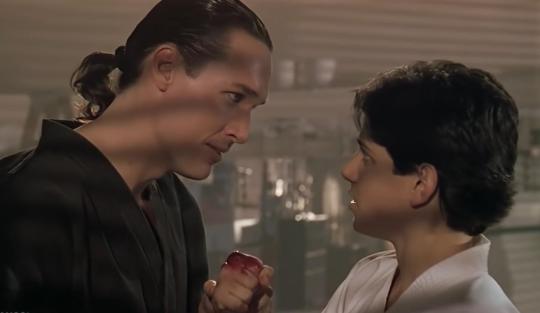
I’m sure this won’t awaken anything in Daniel
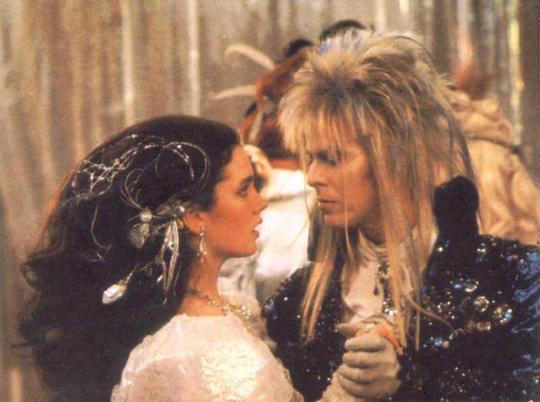
Corporate wants you to find the difference between these two pictures
The hallmark of feminine fairytales tends to be growing into womanhood, with all those symbolic sexual under/overtones, searching for a prince, encountering monsters (or evil stepmothers), on the surface tending to be quite passive/reactive, but actually being about young girls and women getting out of their environment and choosing to tussle with those deep, dark desires – monsters. They’ve got to function within the limitations of power that they have – escaping an abusive situation through marriage, chasing forbidden desires under the guise of duress, asking questions about sexuality through things like symbolic plucking (flowers) or consumption (fruit) or pricking (needles), etc.
Daniel isn’t striking out to find his fortune or win a girl or a kingdom Like A Man, he’s not a threat to Silver, who – like Jareth in Labyrinth – is in control for almost the whole of the narrative, he’s not actually able to do much more than react until he makes the decision to stop training, and even then he’s immediately ganged up on and assaulted, needing to be saved by Miyagi while he stands and watches, bloodied and bruised.
Daniel’s journey in the third movie is to be forced into an impossible situation, seduced by Silver, and then prove that whatever violence Silver did to him isn’t enough to destroy him. It is incredibly similar to Sarah’s in Labyrinth, who by the end declares: “you have no power over me,” and that’s her winning moment. Not strength, not wits, not a direct fight, (although Daniel does fight Barnes and gets beat up again – only winning in in the end by taking him by surprise, unlike in TKK1 or TKK2 where you could argue that he proves himself to be a capable physical opponent to Johnny and Chozen), but by declaring that whatever power was held over her is now void.
Daniel’s narrative isn’t satisfying in the same way, because the dynamic of Silver and Daniel only accidentally emulates this - it’s not an intention on the side of the film-makers.
When Miyagi tells Daniel that he has strong roots, when he tells him not to lose to fear and Daniel wins over Barnes (in an almost fairytale-esque set of events), on paper he’s defeated whatever hold Terry Silver has over him. In the film itself though, Daniel never defeats Silver (which will likely be confirmed once he returns in Season Four). Daniel cannot simply say “you have no power over me,” and see Silver shattered into glass shards.
The film is a contradiction: It wants to be a masculine sports film, but it exists in the same realm as Goblin Kings seducing young girls with the promise of: “Just fear me, love me, do as I say, and I will be your slave.” Unlike Sarah, Daniel doesn’t claim the power that’s been promised to him on his own terms. His subtextually sexual awakening is so corrupted that all he can do is pretend it never happened.
Still, Daniel proves in the film that his strength is not in his fists. It’s in his praying to the bonsai tree that’s healed despite a violent boy brutally tearing it in two.

These looks on Daniel and Silver though?
So why does Silver become obsessed with him? What’s up with all those red outfits (that he doesn’t wear in Cobra Kai)? What does the temptation reveal about Daniel? How does it recontextualise TKK1 and TKK2? Is Daniel bisexual? (yes).
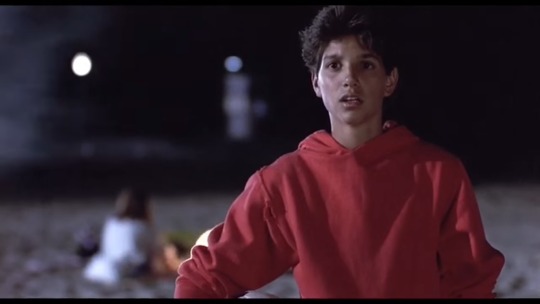
Ah, beach-Daniel, in your red hoodie and your cut-off jorts. Iconic hot-girl summer vibes.
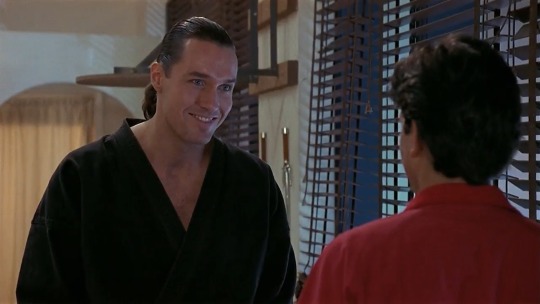
If you didn’t want me over-analysing this, you shouldn’t have put him in so many red outfits and then have this man leering at him like he wants to eat him alive.
Surface-level it’s not hard to read into a Dude Story: Masculine power fantasies are about strength in a very direct way. Fighting, control, suaveness – and if you’re not the most traditionally masculine of guys, asserting dominance through being a good lover or intelligent or overcoming that unmanliness in some way through beating the bully or convincing the hot girl to go out with you, levelling up in coolness. Being A Man. It’s not too dissimilar from Daniel’s arc in the first movie, if you watch it without taking later events into account, although Daniel is never interested in proving himself as a man, and more in making Miyagi proud. Still, he does win and gain respect, and arguably “get the girl,” although Ali’s interest in him was never dependent on the fight.
7. Sexual Awakenings Part 2: Sexual Assault, Liberation, and Queerness
Feminine power fantasies are often about sex. Metaphorically. More accurately it’s “owning sexuality.” Even more accurately: “Freedom.” They also inhabit a fluid space in which empowerment through monstrous desires and non-consent can happen at the same time. And on top of that, many of these “fantasies” are actually being written by men, so whose fantasy is it really? A lot of them are based in oral traditions so presumably they were originally from the mouths of women, even if modern iterations (starting with Grimm’s collections) are filtered through cis men’s perspectives.
All of that being acknowledged: In Angela Carter’s “The Company Of Wolves,” Red Riding Hood unambiguously sleeps with the wolf. Belle discovers her freedom from expectations and unsuitable suitors (and in some versions, evil stepsisters) by falling in love with a Beast (the original novel was written by a woman, the 18th century Gabrielle-Suzanne Barbot de Villeneuve). Jareth informs Sarah of his obsessive devotion to her in Labyrinth. To lean into horror for a moment – Buffy is stalked and eventually has relationships with both Angel and Spike, Lucy in Coppola’s Dracula (which I have mixed feelings about) is raped by the werewolf and Mina is stalked by Dracula, The Creature Of The Black Lagoon kidnaps Kay (the lead’s girlfriend) – subverted in both The Shape Of Water in which Eliza forms a consensual relationship with the amphibious sea-god and in the short-lived horror series Swamp Thing, in which the connection is purposefully framed as seductive…
and in The Karate Kid Part Three Daniel LaRusso punches a board until his hands bleed because an attractive, older man tells him to and in this moment he gives in to what he (thinks he) wants.
Not all of those examples are equal. Some are consensual, some are hinted as abusive and/or stalkery, all of them have large age gaps, and a few are outright non-consensual.
But they’re all fantasies.
They’re all power-fantasies.
Except for Daniel, because he’s a man and the idea that being obsessed (lusted) over by an older man who keeps you in his thrall, specifically because you tickle his fancy for whatever reason, because you’re beautiful, breakable, different – could in any way be considered empowering is a difficult concept to wrap your head around. It doesn’t contain that “but I’m a good girl, I’d never go off the path and pluck flowers if a bad wolf told me to, honest,” societal context or the social context of rape culture. It’s closest comparison is closeted (perhaps even unknown until that point) queer identity.
There have recently been some comparisons of Daniel LaRusso to Bruce Bechdel in Funhome (and everyone who says that Ralph Macchio ought to play him in the upcoming movie: you’re right and I’m just not going to enjoy it as much without him). I’ve written a post about Sam being the heir to his legacy and trauma, specifically as a queercoded man. It’s not dissimilar to the plot of Funhome in a lot of ways.
The other interesting source that’s been going around in connection with Daniel is the essay “The Rape of James Bond,” which discusses the use of sexual assault as a plot device for women and not for men: “About one in every 33 men [in the US] is raped. … [your statistically average, real life man] … doesn’t have a horde of enemies explicitly dedicated to destroying him. He doesn’t routinely get abducted, and tied up. Facing a megalomaniac psychopath gloating over causing him pain […] is not the average man’s average day at the office.” That last bit is just a descriptor of Terry Silver, (although I take issue at the blasé use of psychopath).
The two part youtube essay Sexual Assault of Men Played for Laughs posits that there is nothing more de-masculinising than the threat of sexual assault and therefore any narrative that features this “rightfully” must mock any man who has been a victim or who fears being a victim of sexual assault. It is feminising. There is nothing more humiliating – and therefore unheroic – than a man dealing with sexual assault.
So what do we feel when we see an attractive young man being put into a vulnerable position by an older man? A trope associated with female characters, a trope that is considered unpalatable for men (see reactions that happened when the hint of sexual assault was introduced in Skyfall).
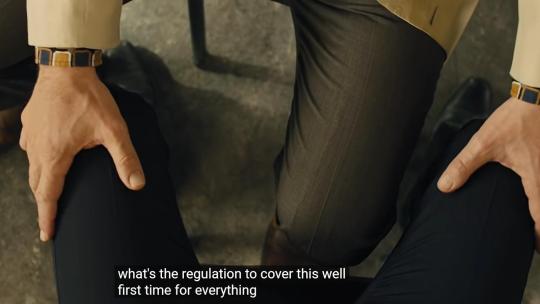
Was it the fact that he was being threatened, or the fact that James’ next line is: “what makes you think this is my first time?”
Some thoughts added by @mimsyaf are around the idea of safety in how a lot of cis women might relate to this narrative through Daniel’s eyes. He’s not a woman, he has – societally – more power than a girl or woman would have, which makes this a different watch to, say, if Danielle were to go through the same narrative. Daniel doesn’t carry that baggage of rape culture, or of the male gaze that you might find in a similar scenario of Buffy the Vampire Slayer or Christine in Phantom of the Opera (and once more the age differences between these characters and the men who love/lust over them are substantial), which makes the narrative “safer” to engage with.
I agree with that, although as a transmasc person I also come at it differently. I specifically like to headcanon Daniel as a trans guy and find his fraught interactions with masculinity through his own non-toxic lens relatable, as well as the way other boys and men react to it – also I think Terry Silver is hot. I know there are people who write Terry Silver with female OCs, which is also a form of empowerment.
On the flipside putting Daniel in this space runs a risk of fetishising him as a queer youth who is either Innocent and Pure, or a bisexual stereotype that deserves to be assaulted for not being a real man. After all, Real Straight Men don’t run the risk of sexual assault.
Alas, the road to empowerment never did run smooth.
The comparisons between the way Daniel is treated by the text and how female characters are often treated in texts are undoubtedly there. Through Ralph Macchio and TIG’s casting and the direction and acting, but also within the text itself.
It might not be with the same purpose as Neo’s symbolically trans journey, but it puts the whole narrative that Daniel’s going through from TKK1 under a different light than if there had only been one movie that ended on a triumphant sports win and a girlfriend.
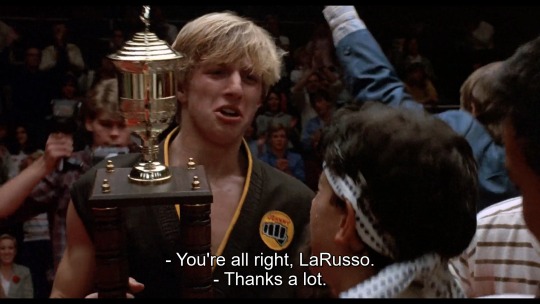
Johnny’s masculinity and the use of tears as liberation, now that’s a whole other analysis….
#daniel larusso#terry silver#the karate kid part three#the karate kid#cobra kai#ck#cobra kai meta#part two of three#we're going into labyrinth and james bond in this one fellas#(non-gendered fellas)
102 notes
·
View notes
Text
FRUITS BASKET S2 EPISODE 9 RECAP AKA THE KYORU CHRONICLES PART I
Look... I’m gonna be honest. I wasn’t really in the mood to do a Fruits Basket recap this week. The world’s always a mess but this time it was definitely a personal attack and I’m still dealing with it but this episode was a needed mental break. A bit triggering at times... but it was golden.
Let’s goooo...
-------------------------------------------
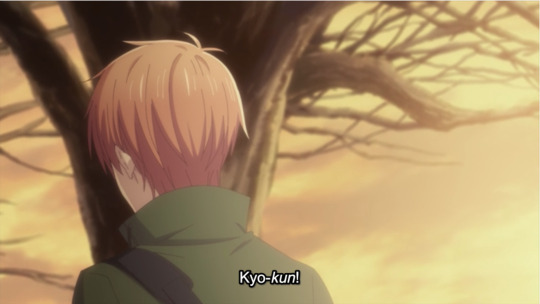


Lol, I love how the creators right out the gate were just like: “Look... you know what time it is...” 🤡😺
- I love Kyo in that green jacket, I don’t even know why 😂It definitely fits in well with the autumnal scene and his hair... He gets outfit appreciation this week again for the same outfit... just because.

HEART EYES, MOTHERFUCKER
*grooves to the opening song like an AC character*

- Tohru’s so happy that Kyo was invited that she’s in tears? On one hand... SO sweet! On the other hand... girl. 😩

Another adored moment between these two. Even though this episode is all about Kyo’s feelings for Tohru. I adore seeing how easy things are between him and Tohru now. At allll timesss. Gimme bucket loads of kyoru content, mannnn


Even though I’m still frustrated at these kids fighting each other, I really appreciate that this moment (and even previous episodes) has shown that Yuki has slowly been figuring out how to play the game of appeasing Akito but also trying to figure out how he can be better and stronger and more clever than the shitty situation that he’s been given. The walls are crumbling, indeed... Yuki wins Best Boi this week. I would’ve given it to Kyo but I lowkey give it to him every week so...


Tee hee... 😺✨💖
...Right, I genuinely don’t know what to say on an emotional front about the Akito and Kyo scene besides “this moment is gross and awful and Akito is a terrible, disgusting, manipulative person” so I’m just gonna talk about my appreciation for how the scene was displayed and edited.

That anime fish eye lens used for intense situations? Classic.
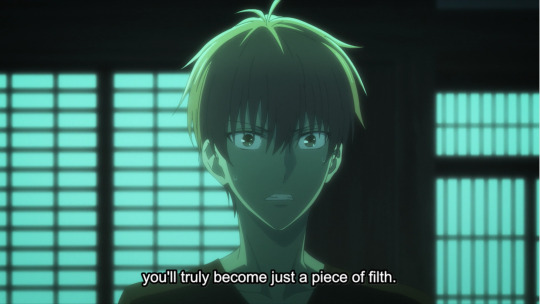
I really did like the flashback scene though. It starts when we see Kyo literally physically threatening Akito and yet Akito through words alone bests him... easily. The colour toning is great, it gives a slightly underwater feel which just increases the suffocating feeling. The way the scene flips from this scene to present day showing how Kyo, despite the time gap and despite all the personal developments, is still in Akito’s suffocating and entrapped position.
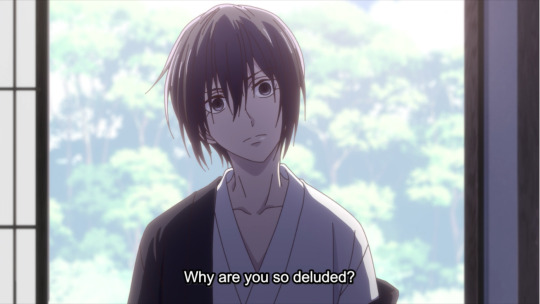
I love how inhuman the designers and animators make Akito through their movements and body poses. I’ve gone into it before but I thought it was worth saying again-again.
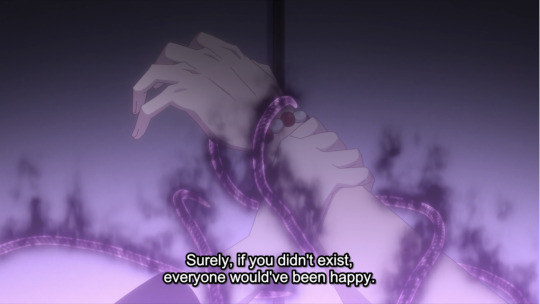


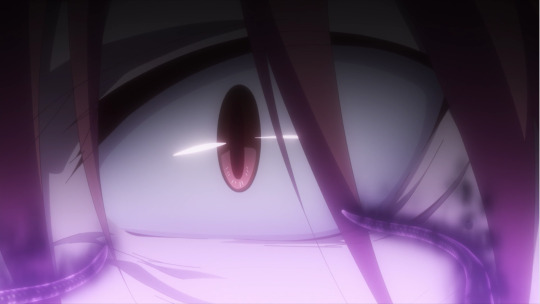
HEARTBREAKING. But, this is some visually stunning content. I love this full on visual representation of Akito’s curse. Seeing how different it is from the other zodiac members (obviously) but also how it could be interpreted as a metaphor for how tied Kyo is to his fate in his position in the zodiac. The stuff of nightmares! Chilling!
- Kyo saying ‘please, stop’ broke. my. heart. Yuma Uchida, as always, was great. I love how different he sounded when he said that. So hurt and weak, it’s almost alien for Kyo...
- Dickheadedness aside... I really find Akito’s view on perfection being monstrous an interesting viewpoint... (even if they are mostly saying it just so they can have the upper hand)
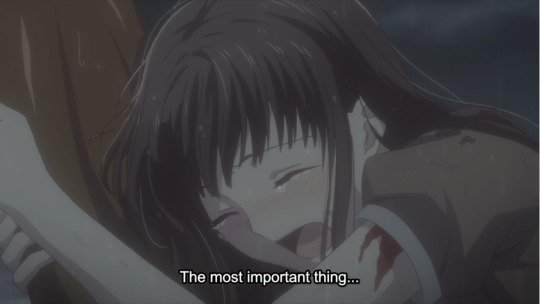
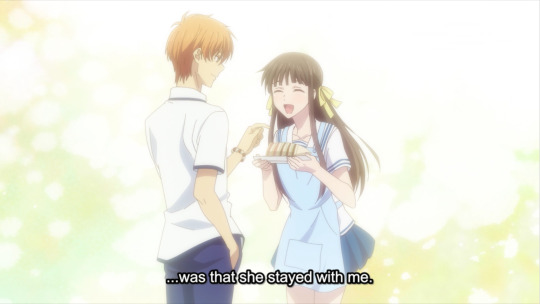
THIS IS THE MOMENT, GUYS...
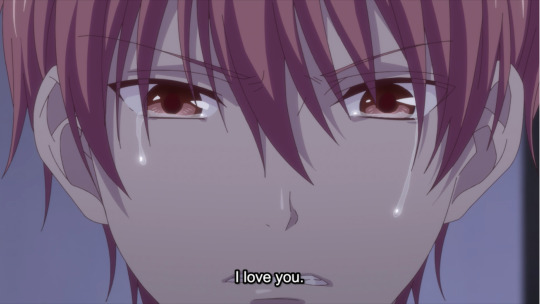
I ACTUALLY SQUEALED. 😍It hurts so goood....
- I’m glad that Momiji’s question from ‘The Foolish Traveller’ moment was brought back again to bring a full circle as to how Kyo felt about Tohru. Such a great throwback.
- But wow, Kyo having to say he hates Tohru to protect her from Akito. Aka the ONLY MEMBER OF THE ZODIAC WHO DENIED THEIR LOVE FOR ANOTHER PERSON TO PROTECT THEM, CAN I JUST SAY. Golden. Heartbreaking. Kyoru.
- STOP HITTING, KYO!!!
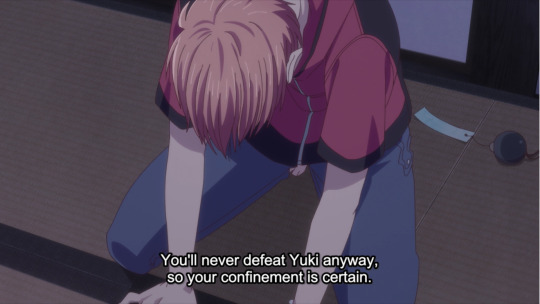
Not so much of a comment on what was said in this scene but more so the position of Kyo’s body. I’m sorry, I’ve turned into one of those yoga heads right now and there’s no going back.

I noticed his position is somewhat between a ‘child’s pose’ and one of the variations of a ‘cat-cow pose’. Child’s pose is known for showing vulnerability and surrender. And the cat side of the cat-cow pose is known for tensing everything up for eventual release into cow pose (as well as it easing out your spine). Also known as by cats... getting ready for attack.
I feel like this winds back to what I was observing about Yuki earlier in which he’s pretty much playing the game that Akito has set up but he’s approaching it in a smarter more clever way. And I think through this visual representation, it shows Kyo is doing the same.
I wouldn’t say that both Kyo and Yuki are at the point where they feel they are worthy of happiness and believe in themselves and are ready to tear the wall down but you can see... they’re kinda getting ready to do so... whether they’ve noticed or not.

Lol. Ohhhhh, the times that we’re in...
- Yuki and Kyo working weirdly in sync is always my favourite <3
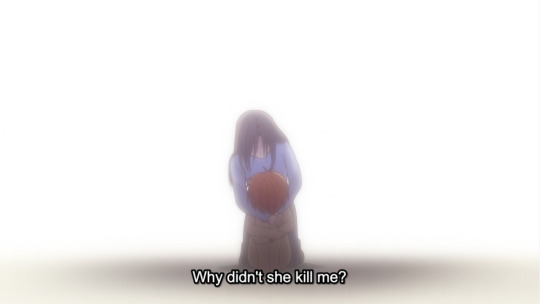

Oh... kid... 💔 All of Kyo’s thoughts of whether he deserves to live and questioning why he keeps going on is... a lot... to say the least...
- I do really love the way Kazuma’s VA delivered the speech of how hope will always bloom again even if you crush it. Toshiyuki Morikawa pretty much nailed how Kazuma would say it in a frank and stern way but also making it seem gentle enough to accept as advice. We stan.
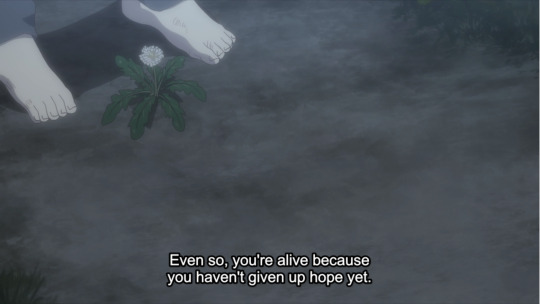
Also, this!!!! 👆🏾
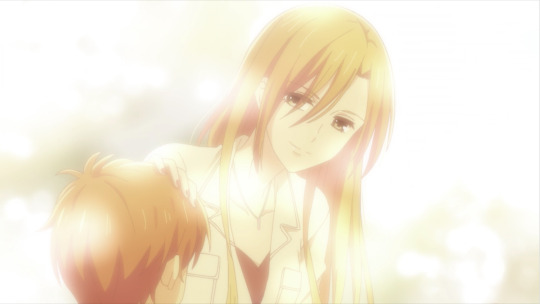
KYOKOOOOOOO 😭(I envy anime only fans sooooooo bad rn, hee hee heeeee)
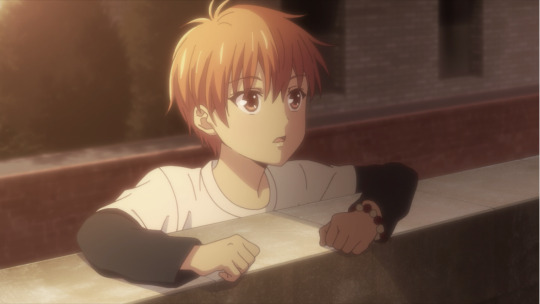
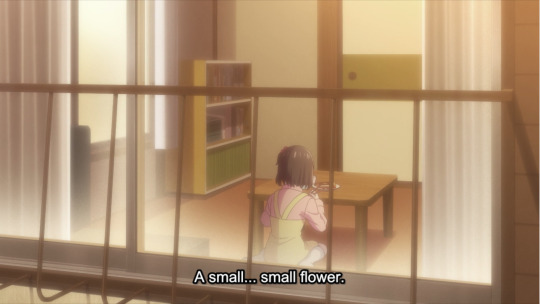
At first, I didn’t really love the fact that Kyo and Yuki knew (or knew of) Tohru before the beginning of the Fruits Basket story as it kinda ties into my disdain for the ‘tied together by fate’ plot line. But as time goes by, I can’t help but just be swayed by how cute the younger versions of the trio are and the uwu feels. Whatever... it cute. For the most part anyway...

I was literally hitting my chair arms by how frustratingly bittersweet this last scene was. Kyo’s ‘I’m putting up a happy front so the love of my life doesn’t worry’ face?! <3
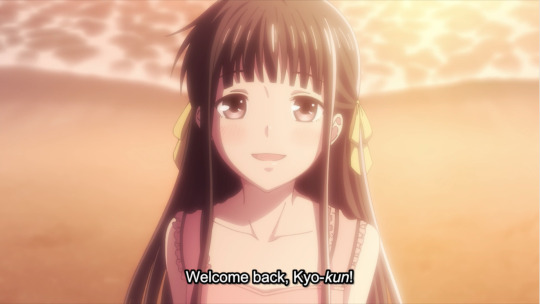
Tohru’s genuine happiness to see Kyo?! <33

<333!!!! Look, I was already dead by this point but THEN
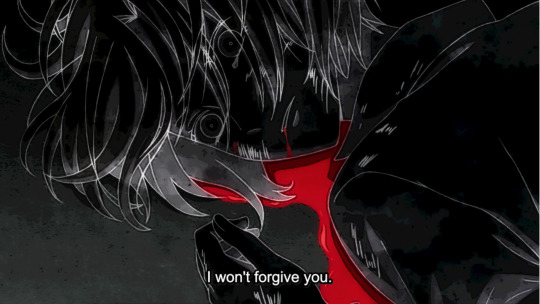
👀...
AND THENNNNNN
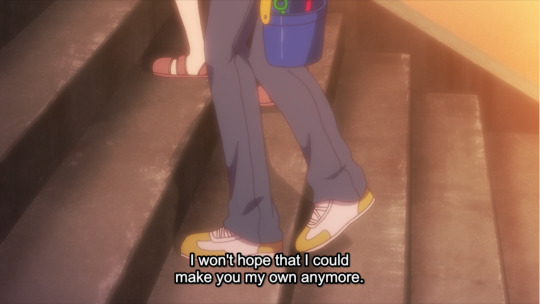
💔🤬
BUT THENNNN!!!!


Like what am I meant to do with my heart at this point, dude? Do I mend it? Do I guard it? Like... what?!?!
That was a hell of a last few minutes. I love this episode.
----------------------------------------
This was really fun! A great way to take my mind off current things. It wasn’t all smiles but it showed pretty much how a glimmer of hope is enough to keep going and that’s exactly what I needed to hear this week and probably for the rest of my life :)
Hope you are all keeping mentally as well as physically well and #blacklivesmatter. ALWAYS. 💜
See you next week!
122 notes
·
View notes
Text
lol i got mad about a thing reylos said. shocking. (tw: nazism, fascism)
just saw a ridiculous post about how people who talk about the first order as being nazis are ignoring history and disrespecting jewish people and let me tell you
that the only reason I didn’t write this on that post is because I think the op is probably jewish and also a kyle ron/reylo fan and lol well. I don’t need to be told I can’t have an opinion on this or that I am attacking them. this is nothing personal, except that reylos have a history of being racist and dismissive about fascism, and so I am honestly shook that someone could be so disingenuous. lol oop that was personal.
if you know anything about film history, you know that george lucas got his inspiration for the empire’s look, and also for certain shots of the rebels, from nazi propaganda made by leni riefenstahl, specifically triumph of the will. (guys don’t go looking it up if you haven’t seen it unless you have a strong stomach because it is really, really disgusting). now, that is more or less what happens when you have a guy who is a student of film history make a movie about, you guessed it, a band of rebels fighting an imperial force but in space. george lucas also put a lot of politics into star wars, specifically anti-fascist messaging. this is like the most basic argument people make when dealing with right-wing fans of sw. this is what we’ve all said to some dumbass white guy who got mad about rey or finn or poe. I would bet that some reylos have also had that conversation, since they care about rey (I guess, although that might be too strong a word; they certainly don’t care about shipping her with a guy who tortured her lol but I digress).
jj abrams took what was already overt fascist imagery from the empire and turned it up to eleven for the first order. this is actually why I found the inclusion of POC as first order OFFICERS (not low level workers Bodhi or stolen baby stormtroopers like Finn) to be kind of fucked up, because it diluted the narrative. do not come at me with some idiotic YESS MORE BLACK IMPERIALS YESS because I am just not here for that brand of idiot representational pinkwashing(? this is a term we use for putting gay shit on monstrous corporate/imperial shit to seem more progressive but it might not be the right term for this).
if you look at the og trilogy, every single imperial officer is a posh white british man, and while I am sure that was partly because diversity was not really something george seemed mindful of, it was also a deliberate thing. like, they clearly wanted to evoke an image of imperialist, and yes FASCIST, rule. this is not that hard to understand so don’t be fucking obtuse just because you like kyle ron or reylo. not that I believe that the intent of the creator is the end all, be all, but in this case it does matter.
yes the anti-alien biases were mainly a product of legends, but I am pretty sure it is also implicit in the original movies because there are no aliens to be found in imperial ranks, and they are everywhere in the rebellion. and yes, I can understand why this might be offensive because you don’t need metaphors to understand why the nazis were bad, and yet. maybe, sometimes, you do need to give people a metaphorical understanding of things they haven’t experienced. and humans have a notoriously difficult time understanding large numbers - so maybe, a visual example of what the fuck genocide might seem like is... idk, helpful for kids? alderaan being death star’d might not be actual history, and it might not represent what jewish/romani/etc victims of the nazis experienced, but it IS chilling. personally I think that tfa did a better job with its death star knock-off because we actually saw people in their last moments. alderaan’s destruction can be rightfully criticized as too distant, since we only see leia’s response, and not what it felt like on the ground. but undoubtedly this is a fictional representation of fascist, imperial might - and all the destruction that comes with it.
it isn’t just visual, and of course the star war isn’t real and no real alderaanians were harmed in the making of the movies. duh. it’s a metaphor, an allegory. like idk who these reylos are kidding, acting like people who criticize you guys for stanning a fascist fuckboy don’t understand that these are just fiction.
the REASON I get mad about reylo and about kyle ron stans, is because nothing exists in a vacuum. NOTHING. not a damn thing. the dumbing down of stormtroopers and imperial ideology (vague though it might be) is actually how Disney gets away with marketing t-shirts with stormtrooper helmets on them to little kids, or like idk how people have convinced themselves that ben solo is just misunderstood and damaged, and not a thirty-year-old man who has made a deliberate choice to commit genocide. his so-called abuse (which we only get to see in a comic? like I’m sorry do better with your sob story) is no excuse for at best being silently complicit in genocide, and at worst actively campaigning for it.
I think there are good critiques that people make about saying the empire is nazism, because obviously this is fiction. you cannot have it both ways. you cannot say that it is anti-fascist when you are arguing with right-wingers who didn’t get that message, and then turn around when people say your fave is at best neutral on genocide (lol) and say we can’t talk about how he is a fascist.
I saw someone say something like, no one calls darth vader a fascist. LMAO yes we fucking do. now I will be the first to admit that anakin gets a lot more empathy, and part of that is because he is a more beloved character with more nuance than kyle ron. and decades of lore. but also because he didn’t grow up a privileged son of a princess, he grew up enslaved and because of his traumas he went right-wing. which does in fact happen. but yeah, darth vader had to die at the end of rotj for a reason - because no one would forgive him for the crimes he committed against the galaxy. it’s tragic because he had the potential to do great, and he redeems himself by killing the emperor, but approximately no critic of kyle ron would ever say that anakin skywalker deserved to go free and live without consequences for his actions.
if I have more sympathy for him, it is because the movies gave me reason. not because he’s hot. or idk a bad boy.
and after the racist abuse that john boyega got from KYLE RON AND REYLO stans specifically, if I were them I would shut the fuck up about how offended you guys are about calling him a fascist or a nazi. you can like your bad boy wet dream if you want, and you don’t have to even like that people think he is a fascist, and you can deny all you want all of that OVERT FASCIST IMAGERY that jj abrams put into tfa, but it’s there, and we don’t live in a vacuum, and I am not here for people dumbing down cultural phenomenon.
redemptions arcs are great! I believe in rehabilitative justice, and I agree that there is a bit of gatekeeping on who gets to be redeemed in stories. but rehabilitative justice isn’t just like you let people who do bad shit get away with it, it is a long process wherein offenders have to do some serious work on themselves. it is not easy. it is not fun, doesn’t end in sex with daisy ridley. and in many ways, it might be harder than doing hard time.
but I also don’t think we get to just... rehabilitate the lead officers who are complicit in war crimes without dealing with what they’ve done, that is how I feel about george bush, and yes, that is how I feel about kylo ren, no matter how much you try to woobify him. because that is what society already does - we let the monsters at the top of the system get away with war crimes and murder and rape, so maybe we should fight that kind of narrative in fiction, too.
we don’t live in a vacuum.
#i have jewish family members and i am not here for this bullshit#like who you like if you must#but that was some cognitive dissonant shit#fascism tw#nazism tw#war crimes tw#i mean these are pretty vaguely mentioned but still#cait got mad#shocking
15 notes
·
View notes
Text
Thoughts about the Deltora Gem Guardians
I’ve fallen back into the fandom of a book series I read as a kid thanks to great art, memes, and analysis by tumblr users like @doomofthehills, @sisterofthesouth, @rat-king-reeah, @dragoninmypocket, and @dragonloverdoran. I’ve been rereading the books and ahve a lot of thoughts about them. Theres a really good post by @mask131 about how each book reflects the stone in it that got me thinking about the gem guardians.

Deltora is interesting for it’s themes of anxiety and despair. Sure, each book has a big scary monster, but often the stakes are as emotional as they are physical. Lief clearly struggles with anxiety, and has two attacks (in Shifting Sands and Shadowgate) that almost read like dissociative episodes. A lot of people have said they interpret the struggle against the Shadow Lord as a metaphor for living with depression or anxiety. Rereading the third series this is quite obvious, but I think there’s a bit more woven into the monsters of the original series. All of the Deltora books have a unique, memorable monster in its climax, some of the most diverse in fantasy fiction. But I think each of these monsters has a deeper meaning. In addition to being twisted versions of the ideal each Gem represents, I think they are each intended to represent a negative thought pattern, one that led them to their monstrous life and one the protagonists must keep themselves from falling into.

First up is Gorl, who I think represents Delusion. I’m not saying he’s meant to be a metaphor for actual psychosis symptoms (though he is one of the more unhinged characters in the series) but rather self delusion. Gorl lives in his own little world, unaware of even the most basic developments of Deltora’s history. He’s also one of the least interested in the stone he guards, obsessing over a different treasure our protagonists don’t even want. Gorl has been consumed by both his own greed and guilt, incapable of accepting the reality he has created for himself. He is a mass of paranoia and ignorance, trapped in a prison of his own making. (A theme later touched on in Isle of Illusion.)

Soldeen is one of the easiest to peg: Depression. Happiness and despair are examined from multiple angles in the Lake of Tears, and in Soldeen’s case he represents the tendency for people to drag others into their own misery. This is most clear when he attempts to force Manus to live with him, but is generally why the Lake of Tears is such a depressing place: it’s ruler would rather force others to join in his misery than find happiness for himself.
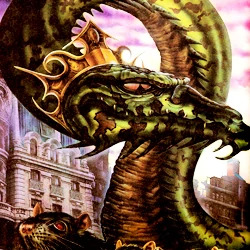
Reeah is also pretty obvious: Narcissism. It is curious how vain Reeah is, given that pride isn’t one of the main themes of City of the Rats. It is an interesting bit of foreshadowing that Reeah considers itself the most valuable of the Shadow Lord’s servants, the “Chosen One.” We see a lot of the Shadow Lord’s minions feel the same way, though in Reeah’s case it might be true. Reeah was tasked with not only guarding the Opal, but the source of the Grey Tide. Reeah is also the guardian most responsible for corrupting its section of Deltora. The City of Rats exists solely to feed Reeah, giving it a kingdom where every other creature is tiny and insignificant compared to it. But the rats small size is made up for by their numbers, and ultimately they end up feeding on Reeah as it fed on them.
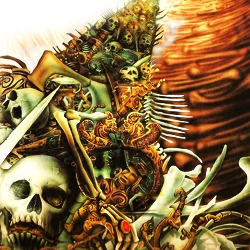
The Hive can be seen as representing Conformity or Compulsion. This sort of thing is par for the course for hive minds in fantasy and sci-fi, but it’s interesting how the Hive affects the minds of those around it. Rigane the Mad and Lief struggled to keep their inviduality when exposed to the will of the Hive. It nearly pushed them into a life of mindless obedience through sheer force of will. The Shadow Lord and his followers always tried to manipulate and control others through trickery and deception, the Hive used brute force. One of the most chilling lines in the series is when Lief realized the warning didn’t say “mindless will to survive” but “mindless will to serve the Hive.” It’s interesting that we never saw the Hive’s queen, though we know it had one. I would assume she was a creature of compulsive service too. The Hive wasn’t about serving an individual, but service for its own sake.
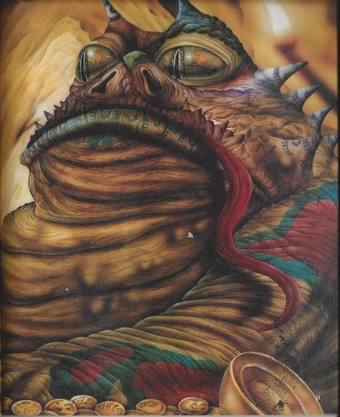
Gellick represents Spite. While Reeah focused on how high it was above others, Gellick relished in punishing those below it. Gellick was petty and demanding, doling out harsh punishments for the smallest slight. It demanded nothing less than complete subjugation and was barely satisfied with that. Gellick was like a petulant child, reminding me of Dudley Dursley. Gellick was able to get away with this abhorrent attitude because it was so certain nobody would rebel against him, as they needed his poison. Gellick took full advantage of this to be as bossy and horrible as possible for he never believed anyone would resist.
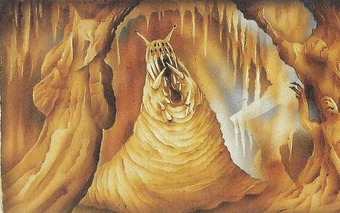
The Glus is a little hard to pin down, but I would argue it represents Instinct. Instincts aren’t necessarily bad, but in order to make it in life you have to resist your base urges every now and then. The Glus’ origin story adds an interesting layer, depending how you interpret it. Either it preserved the girl who cared for it in its web forever, or it ate her despite her kindness, ruled only by its own hunger. Either way I think the Maze of the Beast is not the ideal environment for the Glus, and it can be thought of as an invasive species. I imagine the Glus is meant to crawl in the ocean floor, its massive size free to explore the open sea. It is as trapped in the Maze as its victims, refusing to leave a habitat it was not meant for. I find it notable that the way the trio escaped the Glus is by damaging its home, and it ignored prey in favor of its obsessive need to repair its environment. I also find it interesting how the only two Guardians that are not destroyed are the Glus and the Hive, who are also the only two that are natural parts of Deltora’s ecosystem.
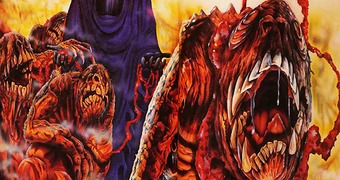
The Guardian of the Diamond is kind of tricky. He’s the most intelligent, and most human of the guardians, so his personality is the most complex. He’s also explicitly associated with greed, pride, hate, and envy, making it hard to associate him with a single theme. However I think that overall he is a creature of Sadism. He is obsessed with games and puzzles, forcing his victims to play them. But he delights in the knowledge that no matter what they do, they are doomed to failure. He is excessively polite and glib, even though he plans to kill everyone he meets. And why wouldn’t he be? He knows they can’t steal the Diamond, and even if they figure out his puzzle, the revelation of his “true name” will make them abandon hope. So he sits on the side, taunting his victims with false kindness and reveling in their inevitable suffering.
It should be noted that in each book, Lief, Barda and Jasmine succeed by rejecting the lifestyle of each guardian. They destroy Gorl with the prison of vines he built around himself. They convince Soldeen to pull himself out of his own despair. They feed Reeah to the masses he lorded over. They retrieve the Lapis Lazuli from the Hive by replacing it with something of equal size but no value, and Lief keeps his sanity with the help of his friends. They destroy Gellick by uniting the Kin and Dread Gnomes in rebellion against him, and his own awful personality is what ultimately kills him. They distract the Glus with a more powerful instinct than its hunger. And they play the Guardian’s game but keep up their resolve the whole time, even at its emotionally devastating conclusion.
Anyway, hope any DQ fans reading this liked it. I’d love to hear your thoughts, And I’m thinking about doing a similar thing for the guardians of the Four Sisters.
91 notes
·
View notes
Note
You want to talk more about the bigotry in Harry Potter? Go ahead! I've actually heard stuff like that before, but have yet to do much research on it personally and it's been a while since I read it, so I'm interested.
WELL
Before we begin I should start with a disclaimer: this analysis will be dedicated to examining as many bigoted aspects of Harry Potter’s writing as I can think of, so--while I personally am more or less comfortable balancing critical evaluation with enjoyment of a piece, and strongly advocate developing your own abilities to do the same--I know not everyone is comfortable reading/enjoying a story once they realize its flaws, and again, while I think it’s very important to acknowledge the flaws in culturally impactful stories like Harry Potter, I also know for some people the series is really really important for personal reasons and whatnot.
So! If you’re one of those people, and you have trouble balancing critical engagement with enjoyment, please feel free to skip this analysis (at least for the time being). Self-care is important, and it’s okay to find your own balance between educating yourself and protecting yourself.
On another note, this is gonna be limited strictly to morally squicky things to do with Rowling’s writing and the narrative itself. Bad stuff characters do won’t be talked about unless it’s affirmed by the narrative (held up as morally justified), and plot holes, unrealistic social structures, etc. will not be addressed (it is, after all, a kid’s series, especially in the first few books. Quidditch doesn’t have to make sense). This is strictly about how Rowling’s personal biases and bigotry impacted the story and writing of Harry Potter.
Sketch Thing #1: Quirrell! I don’t see a lot of people talking about Quirrell and racism, but I feel like it’s a definite thing? Quirinus Quirrell is a white man who wears a turban, gifted to him by an “African prince” (what country? where? I couldn’t find a plausible specific when I was researching it for a fic. If there’s a country which has current/recent royalty that might benevolently interact with someone, and also a current/recent culture where turbans of the appropriate style are common, I couldn’t find it). Of course, it wasn’t actually given to him by an African prince in canon, but it’s still an unfortunate explanation.
More importantly, ALL the latent Islamophobia/xenophobia in the significance of the turban. Like, look at it.
“Man wears turban, smells like weird spices, turns out to be concealing an evil second face under the turban” really sounds like something A Bit Not Good, you know? If you wanted to stoke the flames of fear about foreignness, it would be hard to do it better than to tell children about a strange man who’s hiding something horrible underneath a turban.
Also, Quirrell’s stutter being faked to make you think he was trustworthy is a very ableist trope, and an unfortunately common one. “Disability isn’t actually real, just a trick to make you accommodate and trust them” is not a great message, and it’s delivered way too often by mass media. (Check out season 1 of the Flash for another popular example.)
Sketch Thing #2: The goblins. Much more commonly talked about, in my experience, which is good! The more awareness we have about the messages we’re getting from our popular media, the better, in my view.
For those who haven’t encountered this bit of analysis before: the goblins in Harry Potter reek of antisemitic stereotypes. Large ears, small eyes, crooked noses, green/gray skin, lust for money, control of the banks, and a resentful desire to overthrow the Good British Government? Very reminiscent of wwii propaganda posters, and in general the hateful rhetoric directed towards Jewish people by other European groups from time immemorial.
I’m also extremely uncomfortable with how goblin culture is handled by Rowling in general. Like, the goblins were a people that were capable of using magic, but prohibited by the British government from owning wands. That was never addressed. They also had a different culture around ownership, which is why Griphook claimed that the sword of Gryffindor belonged rightfully to the goblins--a gift isn’t passed down to descendants upon death, but instead reverts to the maker. This cultural miscommunication is glossed over, despite the fact that it sounds like Griphook’s voicing a very real, legitimate grievance.
To be honest, apart from the antisemitism, the way Goblin culture is treated by the narrative in Harry Potter is very uncomfortably reminiscent to me of how First Nations were treated by English settlers in North America, before the genocide really got started. The Goblins even have a history of “rebellions,” which both raises the question of why another species is ruling them to begin with, and more significantly, is eerily reminiscent of the Red River Rebellion in Canada (which, for the record, wasn’t actually a rebellion--it was Metis people fighting against the Canadian government when it tried to claim the land that legally, rightfully belonged to the Metis. But that’s another story)
In sum: I Don’t Like the implications of how Rowling treats the goblins.
Sketch Thing #3: Muggles. Ok because we’re all “muggles” (presumably) and because I’m white, talking about this might rapidly degenerate into thinly-veiled “reverse racism” discourse, so please y’all correct me if I stray into that kind of colossal stupidity. However, I am not comfortable with the way non-magical humans are treated by Rowling’s narrative.
The whole premise of Harry Potter is that Evil Wizards Want To Hurt The Muggles, right? Except that it’s not. Voldemort’s goal is to subjugate the inferior humans, rule over non-magical people as the rightful overlords, but that’s hardly mentioned by the narrative. Instead, it focuses on the (also egregious and uncomfortably metaphorical) “blood purism” of wizarding culture, and how wizards would be persecuted for their heritage.
But muggles, actual muggles, are arguably the ones who stand to lose the most to Voldemort, and they’re never notified of their danger. We, the muggles reading it, don’t even really register that we’re the collateral damage in this narrative. Because throughout the series, muggles are set up as laughingstocks. Even the kindest, most muggle-friendly wizards are more obsessed with non-magical people as a curiosity than actually able to relate to them as people.
I dunno, friends, I’m just uncomfortable with the level of dehumanization that’s assigned to non-magical humans. (Like, there’s not even a non-offensive term for them in canon. There’s “muggle,” which is humorously indulgent at best and actively insulting at worst, and there’s “squib,” which is literally the word for a firework that fails to spark.) It’s not like “muggles” are actually a real people group that can be oppressed, and like I said this kind of analysis sounds a bit like the whining of “reverse racism” advocates where the powerful majority complains about being insulted, but... it kind of also reeks of ableism. People that are not able to do a certain cool, useful thing (use magic) are inherently inferior, funny at best and disposable at worst. They suffer and die every day from things that can easily be cured with magic, but magic-users don’t bother to help them, and even when they’re actively attacked the tragedy of hundreds dying is barely mourned by the narrative.
It gives me bad vibes. I don’t Love It. It sounds uncomfortably like Rowling’s saying “people that are unable to access this common skill are inherently inferior,” and that really does sound like ableism to me.
Either way, there’s something icky about consigning an entire group of people to the role of “funny clumsy stupid,” regardless of any real-world connections there may or may not be to that people group. Don’t teach children that a single genetic characteristic can impact someone’s personhood, or make them inherently less worthy of being taken seriously. Just, like... don’t do that.
Sketch Thing #4: The house elves. Everyone knows about the house elves, I think. The implications of “they’re slaves but they like it” and the only person who sees it as an issue having her campaign turned into a joke by the narrative (“S.P.E.W.”? Really? It might as well stand for “Stupidly Pleading for Expendable Workers”) are pretty clear.
Sketch Thing #5: Azkaban. Are we gonna talk about how wizarding prison involves literal psychological torture, to the point where prisoners (who are at least sometimes there wrongly, hence the plot of book 3) almost universally go “insane”? This is sort of touched on by the narrative--“dementors are bad and we shouldn’t be using them” was a strongly delivered message, but it was less “because torturing people, even bad people, is not a great policy” and more “because dementors are by their natures monstrous and impossible to fully control.”
“This humanoid species is monstrous and impossible to control” is, once again, a very concerning message to deliver, and it doesn’t actually address the real issue of “prison torture is bad, actually.” Please, let’s not normalize the idea that prison is inherently horrific. Of course, prison as it exists in North America and Britain is, indeed, inherently horrific and often involves torture (solitary confinement, anyone?), but like--that’s a bad thing, y’all, it’s deeply dysfunctional and fundamentally unjust. Don’t normalize it.
Sketch Thing #6: Werewolves. Because Rowling explicitly stated that lycanthropy in her series is a metaphor for “blood-borne diseases like HIV/AIDS”. The linked article says it better than I could:
Rowling lumps HIV and AIDS in with other blood-borne illnesses, which ignores their uniquely devastating history. And Lupin’s story is by no stretch a thorough or helpful examination of the illness. Nor is its translation as an allegory easily understood, beyond the serious stigma that Rowling mentioned.
That Lupin is a danger to others could not more clearly support an attitude of justifiable fear toward him, one that is an abject disservice to those actually struggling with a disease that does not make them feral with rage.
This definitely ties into homophobia, given how deeply the queer community has been affected by HIV/AIDS. Saying a character with a condition that makes him an active threat to those around him is “a metaphor for AIDS” is deeply, deeply distressing, both for its implications about queer people and their safety for the general population, and for the way it specifically perpetuates the false belief that having HIV/AIDS makes a person dangerous.
Sketch Thing #7: Blood Ties. This isn’t, like, inherently sketch, but (especially for those of us with complicated relationships to our birth families) it can rub a lot of people the wrong way. Rowling talks a big talk about the folly of “blood purism,” but she also upholds the idea that blood and blood relations are magically significant.
Personally, I’m very uncomfortable with the fact that Harry was left with an abusive family for his entire childhood, and it was justified because they were his “blood relatives.” I’ve had this argument with ultra-conservative family friends who genuinely believe it’s a parent’s right to abuse their child, and while I don’t think that’s what Rowling is saying, I do feel uncomfortable with the degree of importance she places on blood family. I’m uncomfortable with the narrative’s confirmation that it is acceptable (even necessary) to compromise on boundaries and allow the continuation of abuse because “it’s better for a child to be raised by their Real Family” than it is to risk them to the care of an unrelated parent.
Genetic relations aren’t half as important as Rowling tells us. For people with a bad birth family, this can be a damaging message to internalize, so I’ll reiterate: it’s a pretty thought, the love in blood, but it’s ultimately false. The family you build is more real, more powerful and more valid than any family you were assigned to by an accident of genes.
I can think of one or two more things, but they’re all a lot more debatable than what I have here--as it is, you might not agree with everything I’ve said. That’s cool! I’m certainly not trying to start a fight. We all have the right to read and interpret things for ourselves, and to disagree with each other. And again, I’m not trying to ruin Harry Potter. It’s honestly, as a series, not worse in terms of latent bigotry than most other books of its time, and better than many. It’s just more popular, with a much bigger impact and many more people analyzing it. I do think it’s important to critically evaluate the media that shapes one’s culture, and to acknowledge its shortcomings (and the ways it can be genuinely harmful to people, especially when it’s as culturally powerful as Harry Potter). But that doesn’t mean you can’t or shouldn’t enjoy it for what it was meant to be: a fun, creative, engaging story, with amazing characters, complex plots, heroism and inspiration for more than one generation of people.
Enjoy Harry Potter. It is, in my opinion, a good series, worth reading and re-reading for enjoyment, even for nourishment. It’s also flawed. These things can both be true.
#harry potter#linden writes an essay#long post#THANK YOU for the ask lunar i am SO HAPPY to write all this#i do hope i didn't offend anyone though#please let me know if i've been unintentionally racist y'all i'm white as rice and very willing to learn and grow#also i think it's possible i missed mentioning something glaring because like. harry potter is good but jk rowling is... not#but i think i got most of my thoughts down#harry potter meta#racism#homophobia#bigotry#ask linden#jk rowling
33 notes
·
View notes
Link
With the film industry as we know it—A-list stars swanning around studio lots amid the swirling winds of an entire city bellowing buzzwords about makin’ pictures—essentially nonexistent at the moment, here’s an especially provocative idea as we contemplate its eventual return: What if Hollywood was... better?
Not in terms of quality of output, though if we’ve learned anything through the industry’s glacial inching toward progress, that will follow suit. But what if the industry was more inclusive? What if it was less afraid of change? What if it allowed gay people, people of color, women, and minorities to tell their own stories, to be in charge—and what if the people accepted it?
Better yet, what if it was always that way?
Like the loud, harsh clack of a clapboard coming down on 70 years of motion picture history, Ryan Murphy’s revisionist manifesto Hollywood arrives Friday on Netflix with blinding, blaring, technicolor confidence. Hardly subtle, deliciously ostentatious, and admirably mischievous, the lavish seven-episode series is a love letter to Hollywood by way of 2020 think piece.
It is messy and thrilling, upsetting yet profound; as uneven and as enthralling as any of Murphy’s big-swing, genre-contorting efforts: Glee, American Horror Story, or The Politician. But as with his soapy historical study Feud: Bette and Joan, it is a fastidious celebration of a glamorized time in Hollywood that mines nostalgia for modern meaning—a fragile undertaking swaddled in the dazzle of unmatched production design and talent pedigree.
Hollywood flops as often as it soars, but never rests in its grandiosity and ambition. The result is something escapist and frothy at a time when a retreat to a Hollywood happy ending is as alluring a fantasy as they come.
There is brilliant acting and there is bad acting. There are ovation-worthy ideas and there are off-putting ones. But, above all, there is reason to watch: It is gay, it is sexy, it is Patti LuPone.
Hollywood is a revisionist history of cinema’s golden age. It’s the 1940s in all their glamour and art: Casablanca! Citizen Kane! Alfred Hitchcock! Jimmy Stewart! Rita Hayworth! Cary Grant! It’s an era that’s been romanticized for so long that we’ve internalized it, morphing our own lifestyle aspirations to conform to its very heteronormative, very patriarchal, very (very) white ideas about sex and gender roles. These were ideas, however, that the industry was telegraphing, but not living in real life. Not at all.
Murphy and his team’s rewriting of history pulls the curtain back, exposing the sexually fluid proclivities of the stars—leading men sleeping with male escorts; Oscar-winning actresses in bisexual affairs—and the damning, racist barriers to inclusion fortified by studio heads thwarting any opportunity for progress.
Then, and here’s the crux of the whole thing: Hollywood changes that narrative. We glimpse the power dynamics inside Tinseltown’s gilded cage, and watch them being dismantled.
Some of the players’ narratives are real, and some are fiction. That makes for an amusing parlor game for viewers, attempting to separate the true history from the imagined one, and should birth a cottage industry of “The Real Story Behind…” stories in the weeks to come. But these are actual people who never had the opportunity to live authentically or see true, equal opportunity in the industry. Expect there to be a split among those who find happier, reimagined fates for them a sweet gesture, and those who find it in bad taste.
The story trains in on Jack (David Corenswet), a World War II veteran arriving wide-eyed in Hollywood, hoping some gumption and a jawline God shed a tear after creating will be enough to get him into the pictures. But he’s got a pregnant wife (Maude Apatow) to think about. Until he catches the eye of a casting director, he has to find some way to pay the bills. That cash flow comes surreptitiously from a gas station owner (Dylan McDermott), whose dashed Hollywood ambitions leave a soft spot for attractive dreamers like Jack—particularly ones who prove lucrative in his under-the-table prostitution business. A customer comes in for a fill-up, so to speak, and whispers the code, “I want to go to Dreamland,” and, well, you know the rest—and hopefully get the hardly nuanced metaphor about sex, power, sacrifices, and Hollywood.
This gas station business is without a doubt inspired by Scotty Bowers, the notorious L.A. hustler who died last year at 96, following a scandalizing, dishy documentary and memoir revealing the brothel he ran out of a petrol stand, sleeping with (allegedly) Cary Grant, Spencer Tracy, Bette Davis, Vivien Leigh, Gary Cooper, J. Edgar Hoover, and Rock Hudson.
McDermott’s character, however, is not actually Scotty Bowers, a distinction that’s necessary because Rock Hudson actually is a character, played by Jake Picking. So is Henry Wilson, the monstrous, closeted Hollywood agent played by Jim Parsons, who trades blowjobs for representation. Elsewhere, real-life trailblazers like Hattie MacDaniel, Vivien Leigh, and George Cukor show up. Their presence, on the one hand, lends credibility and grounds the fantasia of diversity and acceptance that Hollywood builds to. It’s also morally amorphous.
Hudson was closeted until the day he died of HIV/AIDS. He didn’t get the happy ending imagined here, publicly coming out of the closet by attending the Academy Awards with his fictional black, gay screenwriting boyfriend, holding hands on the red carpet, and staying on track on his ascension to Hollywood hunk. There’s also no evidence that Wilson, as caustic and self-loathing as the devil himself when we meet him in the show, had a change of heart and becomes a LGBT crusader seeking amends and atonement.
The wishful thinking is nice. But the bleakness of the reality shouldn’t be forgotten. There’s no clean place to land there, other than to consider both.
But these are just a handful of Hollywood’s players, and not even the true engine of the plot. In typical Murphyland fashion, there is a dizzying constellation of characters and their errant business to keep tabs on.
At the forefront is Patti LuPone’s Avis, the bored wife of a studio head (a scene-stealing Rob Reiner) who is first introduced as a client of Jack’s—hence all the press about the Tony winner’s explicit sex scenes that you’ve likely been reading—and eventually put in charge of the studio itself when her husband is incapacitated by a heart attack.
If it’s novel now to think of a female in charge of greenlighting projects and making commercial creative decisions, imagine it seven decades ago. And Avis shakes things up. With a casting director (Holland Taylor, perfect) and producer (Joe Mantello, heartbreaking) as her conspirators, she greenlights and positions as the studio’s next blockbuster a film called Meg, with its historically diverse creative team intact.
That means half-Filipino director Raymond (Darren Criss), black screenwriter Archie (Jeremy Pope), black leading lady Camille (Laura Harrier), and Jack and Rock in supporting roles. It takes willfulness to bulldoze the fortresses that bar progress. That is invigorating and moving to watch, especially as Hollywood dances between comedy, camp, earnestness, and tragedy with all the glee, if you will, that you’d expect from a Ryan Murphy production.
There’s sex—hot sex, gay sex, interracial sex, intergenerational sex—and there’s farce and there’s a wardrobe and set budget to sweep you away like a riptide.
There are scenes from Parsons and LuPone that will win them Emmys. Mantello and Taylor have a two-hander together that shattered me into so many pieces I am billing Ryan Murphy the cleaning fee. I worry that even with his Netflix money it won’t be enough—that’s how good it is.
Mira Sorvino and Queen Latifah give so much in their scenes as guest stars that you wish they were in more but are grateful for the flawless blips of bliss, while Michelle Krusiec as Anna May Wong, the first Chinese American movie star, is the epitome of an actor making a monumental moment out of limited material.
Criss solidifies his leading-man status—he’s captivating in every scene, even without much to do—and Corenswet brings glimmers of gravitas to eye candy. But the rest of the kids nearly torpedo the whole damn thing, they’re so miscast. The scenes with the older generation are so rich and such an utter joy to watch, it only makes the woodenness of performers like Picking and Harrier all the more egregious. Thankfully, there’s a larger message to it all that acts as absolution.
If Hollywood were a treatise on how society interacts with movies and TV both then and now, then the thesis could likely be boiled down to an early conversation between Raymond, Criss’ director character, and Dick, Mantello’s studio exec. It’s Raymond’s dream to direct a movie starring Anna May Wong. Dick kills the pitch, saying no one will pay to see a movie with an Asian lead, or any lead of color.
Raymond doesn’t stand for that. How does he know? No one’s tried. “Sometimes I think folks in this town don’t really understand the power they have. Movies don’t just show us how the world is, they show how the world can be. If we change the way that movies are made, you take a chance and you make a different kind of story, I think you can change the world.”
It’s not a stretch to argue that as the mission statement of Murphy’s entire career. He’s proved it time and again, from Glee to Pose: Bring the marginalized out of the margins and watch how things change. Someone just has to be the one to do it.
In essence, Hollywood sees Murphy dramatizing the progress that he played a part in catalyzing today, but imagining if it had come at a different turning point in cinema history—70 years ago. More tantalizingly, he raises the question of what society today might be like had it actually happened then.
Is it a little self-congratulatory? Sure. But, hey, that’s showbiz, kid.
#darren criss#the daily beast#hollywood#press#hollywood spoilers#just in case#april 2020#hollywood review
39 notes
·
View notes
Text
I was tagged by @antirococoreaction to talk about five male characters I love
(God, only five? However will I choose between my boys >_< ?!)
This is most certainly not going to be a literary as your offerings, lmao. When it comes to literary fiction I mostly like Kafka and Kafka, by the nature of his writing, writes thoroughly unlikable characters.
This got way too long bc I’m incapable of not gushing about my faves when given the chance lol
Zuko from Avatar: The Last Airbender

It is my enduring opinion that if you want to see a redemption arc done right, look at Zuko’s arc in The Last Airbender. He’s a scared, abused kid who managed to build up personal morals in a system that discouraged them, and was harshly punished for daring to voice them. He’s someone who always wanted to be good, but struggles with defining what good is, given that his culture and upbringing has taught him one thing, but his heart (and his uncle) tells him another, and his new experiences reinforces that. After he figures out what “good” looks like, he’s always held accountable for his past actions. He makes amends, and he accepts it, for the most part, when people aren’t ready to receive them. His anger issues, as well as how he sees himself as someone who had to be hardworking because he isn’t talented (however far from the truth that may or may not be in reality) are also aspects of him that appeal to me and indeed that I relate to.
Anakin Skywalker from Star Wars
My love for Anakin is not dissimilar to my love for Zuko, though the quality of the writing in question certainly is. I love an edgy boy, is what I’m getting at, I guess :’D More seriously, Anakin’s story is ultimately one about control, which is a subject that interests me quite a bit. Anakin is never, at any point, really in control of his own life. He’s never really truly free. He’s born a slave, he joins the Jedi Order and he becomes Palpatine’s apprentice. He always exists within rigid systems of control, until his very lasts moments with Luke before he dies. With how Palpatine essentially groomed him, thinking of Anakin as equally a victim of Palpatine and a perpetuator of his (metaphorically speaking) abuse is also interesting to me. Certainly his clearly distorted thinking (eg convincing himself he can’t trust Obi-Wan, for instance) is also hugely important to his appeal to me. Also? He’s SO EXTRA I can’t with him lol

(That’s your LIFE SUPPORT SYSTEM you turned off, Anakin!!! I know you’re depressed and dissociated and also The Drama but damn!!!!!!)
Nicodemus Ravens from The Shamer Chronicles (Skammerens børn)
The Shamer Chronicles is a series of Danish fantasy books for kids, and probably the most popular books of that type (particularly the first book, The Shamer’s Daughter). Nico is a major character, though never a POV one.
Nico was, essentially, abused by his father for not living up to the male gender role. He didn’t want to learn to use a sword, he didn’t want to kill, and his father hated him for it. As a result, he’s a teenage alcoholic and profoundly at war with himself. He constantly have other people telling him narratives about who he is/should be: first, he’s the younger son who should bring his father glory, then he’s the heir unfit for the throne, then he’s, depending on the political position of the character in question, either a monstrous murderer who must be killed by the glorious leader or the rightful heir to throne, a hero ready to bring war to his enemy and liberate his people, then rule them in benevolence.
Nico doesn’t want to be any of those things. He knows who he is, is stubborn about it, but also can’t shake the belief that his relative pacifism is really just cowardice. I’m just going to quote one of my favourite scenes here (forgive the translation, it’s my own, I don’t have the official one at hand):
“[...] They want a hero, I think.”
“Is that so bad? It’s better than being a monster, at any rate.”
“You think? Have you noticed how often heroes die in battle? Of course everyone mourns them afterwards and write beautiful ballads about them, but the heroes remain dead. Stone-dead. And I’m in no hurry to get on my white steed and start slaughtering people until someone better or luckier than I sticks a sword in me. No, thank you.”
He looked both obstinate and shameful, as if he thought he really should get on his white steed and all of that. I could understand why he didn’t want to die, and yet… Well, I think I’d always expected him to return to the Lowlands to fight Drakan at some point.
“What do you want, then?” [...]
“I just want to be me,” he whispered. “Is that so terrible? I just want to be Nico and not a lot of other people’s hero or monster.”
Anyway there are Two Crimes when it comes to Nico: the fact he isn’t gay in canon and how so many adaptations turns him into the Generic Fantasy Hero he’s a very conscious subversion of in the books (the other principle male character is essentially someone who’s hurt by toxic masculinity as someone who buys into it, while Nico ofc is hurt by it because he doesn’t/can’t, so the series certainly had an opinion about it).
Albus Dumbledore from Harry Potter
Dumbledore is, to me, someone who chose what was good for the world over his own happiness. He chose to be the one to dirty his hands, the one two make the terrible decisions, do the terrible things, that were necessary in the battle against facism. There is something very brave and admirable about that to me. It’s not that he never did anything wrong, he certainly did, but again, I think he was very aware of the terrible things he was doing, and part of the reason he keeps everything so close to his chest is because he doesn’t want anyone else to have to make those decisions, to have to feel that blood stain their hands. Dumbledore loves the people in his care profoundly, he loves Harry profoundly. And it kills him to have, as Snape puts it, “brought him up like a pig for slaughter”.
Whether something is morally justified and whether it’s necessary to prevent evil are two different questions, and I don’t think Dumbledore feels particularly justified, but I do think he does what he perceives to be necessary to prevent facism. And hates himself for the decisions he takes along the way. And all of that comes back to, to some extent, his survivor’s guilt over the death of Arianna and the profound wake up call that was Grindelwald 1) turning on his family 2) being a very violent fascist, rather than just a theoretical one like teenage!Dumbledore was. In his mind, Dumbledore is already condemned for what happened when he was 18, so it’s better that it be he who takes the terrible things upon himself than an “innocent.” It’s better that he try to atone. Dumbledore is working towards a redemption he never (to his mind) arrives at.
In regards to his sexuality, Dumbledore was certainly written with the trope of a “tragic old closeted gay” in mind, but of course JKR never made anything much canon aside from his “flamboyant” sense of style (that the movies have ROBBED us of >:( ) and hobbies, so to a certain extent, I get to ignore that homophobic intent. In the books themselves, the only thing you can really read between the lines is that Dumbledore was in love with Grindelwald, not whether it was 1) reciprocated 2) acted upon, so with only the canon, we also get to mitigate some of the Implications of “Dumbledore dated Wizard Hitler for a while”....
I mean I do Love Mess(tm) so Dumbledore having that terrible wake up call is certainly also part of the appeal for me. Personally I enjoy the interpretation that Grindelwald deliberately manipulated Dumbledore’s feelings.
Captain Flint/James McGraw from Black Sails
BE GAY DO CRIME BE GAY DO CRIME BE GAY DO CRIME BE-- *coughs*
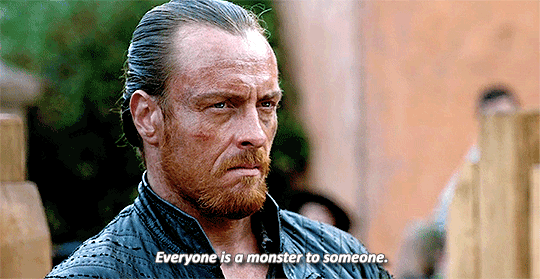
As you might guess from my description of Dumbledore, a lot of the reasons I love Flint are similar to why I love Dumbledore (and Solas, but we won’t go in to Solas rn lol). Flint is also someone who chooses to do the terrible, necessary things, who chooses the fight over his personal moral cleanliness. In a more obvious and extreme way than Dumbledore, certainly, but the principle is essentially the same. Of course, Flint’s fight is personal in a completely different way from how Dumbledore’s is. Flint’s fight is simoultaneously his revenge, a fight against the corrupt system that ruined his life and a fight for something better. Dumbledore is defensive, Flint is offensive.
The self-integrity he has is truly amazing. He’s cast aside by everyone but Miranda, and yet he never starts thinking he has anything to apologise for. To ask for a pardon would be to ask for forgiveness, and he doesn’t think he needs to be forgiven. Not for loving Thomas, not for anything he did while he was still English. He perceives the reality of the situation, he sees what is right and what is wrong, and he knows that he is the wronged party. He stares at the behemoth of the entire social structure of his world and says: No. You move. I am not in the wrong. England should apologise to me.
Flint is my angry gay dad and I love him.
I tag (as always, completely optional ^^ ): @teddy-stonehill @thebearmuse @andvaka @solitarelee @gallifreyanathearts @sinni-ok-sessi @melle93 @papanden @seimsisk
I feel a bit dishonest leaving Grantaire off of this list, lmao, but I talk about him enough as it is.
Other honorables mentions go to: Enjolras (Les Mis), Captain Jack Harkness (Doctor Who/Torchwood), Solas (Dragon Age), Fitzwilliam Darcy (Pride and Prejudice), Kim Kitsuragi (Disco Elysium), Harry Potter, Remus Lupin (Harry Potter) and my soap boys Robert Sugden (Emmerdale), Richard “Ringo” Beckmann (Unter Uns) and Ben Mitchell (Eastenders).
#someone: like a none edgy boy me: a what now#not that nico is that edgy#btw if i had been the type to name myself after fictional characters it would have 100% been nico#the movie adaptation does not deserve rights#also re dumbledore jkr is like ''he turned into a bit of a celibate after grindelwald'' and i'm like nah NAH fuck off#siggi rambles#tag meme#my meta
12 notes
·
View notes
Text
The Siren & The Healer
Natasha Romanoff arc
Prologue: The Unknown
Platonic Natasha x fem!Reader, Loki x fem!Reader
Theme: With cracks between the most powerful superheroes of the earth, Natasha Romanoff does not find rest when she is assigned on a mission to find the missing pieces of a puzzling power that once nearly got into the hands- rather, tentacles- of Hydra. In order to unearth the pieces, she must dig through her own past and make a decision that might decide the fate of the earth in the coming wars.
Series: Will contain violence, death, destruction, softness, fluff, smut, friendship, and whatnot
Chapter warnings: drive safe
A/N: This was written a few years ago with an OC in mind so reader has a name but it is a reader insert.
MASTERLIST in bio, love
The silence of vacuum is unlike any other. There is an absolute absence of any disturbance around you. Purest form of final layers, muted. Here, you can hear no one. Here, no one can hear you. It is that plane of metaphorical peace where one truly zones out every other bit of noise. No sensation disturbs your auditory senses. Nothing grazes your nerve endings. It is plain deadly silence. But the lull of vacuum in space is a phenomenon of its own kind. Everything around you is dark and light all at the same time. Alluring in every sense. Even as you are feeling your final breaths being scooped out of you by an invisible hand, gushing out of your throat to bring all the molecules out of your lungs, you are sure to think at least once that it might actually not be a bad place to die after all.
That was Loki’s thought. The view of his galactic home was the last thing he saw when he had come to and was the last thing he thought he would see as his sluggish healing under the fatal injuries could not keep up with the foreign space around him, eroding his existence cell by cell, chipping away at his skin bit by bit into the void surrounding him, nearly causing him to choke on the grim memories of the last time he was aimlessly floating in space like this, accelerating his breathless state and heart burning in the cold that bitterly surrounded his body.
Today, unlike the day he let the void swallow him wholly to find that peace in death which he could not find in his life or in his family, his tears made a hushed satellite call to no one in particular - a prayer from the God for some sign. He did not even know who he was asking for. There was no one left now. Nothing to go back or look forward to. He didn't know if his brother had made it out alive. The last trace of his supposed family gone for all he knew.
And still, a thought passed him. A thought of his mother’s warm embrace. The one thing he had reminisced time and again in his mind so as not to forget her face after her death. And even as he floated in the infinite abyss, he internally chuckled at himself for living his last moment just like he had lived his first - alone.
So the chaos that was me was born to be undone by chaos, after all, he thought to himself, feeling the final choke of the empty inside his body.
He saw his floating hands turn blue in front of him before the frost gathered. Why was death such a slow and dull process? His red eyes felt the pinch of the frost as they began blurring his vision; the illuminated space around him gradually turning white.
And the monster dies the death that was written for him in the stone he was abandoned upon on the day he was born.
The frost gnawed with a warm glow near his cheek. It would have made him flinch, if he could in that situation, for this was nothing like the cold he was used to. He waited for it to dissipate in his final second and nudge him into eternal sleep if not into a specially made hell.
But it did nothing of that sort. It only glowed further; growing into an uninvited warmth that slowly penetrated his skin before he could fathom the absurdity of unknown energy illuminating him on the inside. The white in front of his eyes started to melt away a little, allowing him to see an obscurity floating beside him. He wanted to speak but the icy dryness inside his throat prevented him from doing so.
Who are you? A confused mellifluous feminine voice ran throughout his nerves, reigniting the functioning sparks that had been dying a few seconds ago, feeling a wave of warmth wash inside him.
He felt it should be him asking that question to this stranger before he felt the same spirit engulfing his hand where the fuzzy figure floated beside him. He felt a surge of chagrin inside him - now that death was leaving him reluctantly - as he realised it was the figure’s hands warming his face and palm. He wanted to take one good look at the face of the one picking him up from the frustrated grip of annihilation, and he nearly caught a glimpse of beady y/e/c eyes staring back at him before a blazing light instantly made them disappear along with the figure that bore them, flooding his vision with a golden white before he felt himself colliding with a solid surface.
“What the hell, Rocket?!” A tired groan left the God as he slid off the glass and into unconsciousness. “You killed a man!”
______
It was one of those midsummer mornings where the ceiling fan was enough to remove the hefty sweat the hot fireball outside had been working on for quite some time but the obnoxious breeze would just twirl its way through the greenery surrounding your house before coming through your door and windows to take away the unnecessary heat.
There was no humdrum outside but you still woke up because something had been tickling your brain for quite a while. A thought was hiding somewhere behind those everyday intricate speculations like one stubborn louse that you know is there but it just wouldn’t come out.
You could see the garden outside and the wall marking the boundary as you walked from your living room towards the door. The house in front seemed to have freshly painted their outer walls- either that or the sun hitting them from behind your home seemed to do the trick. It was barely two steps to the door now when you saw them.
A man in a blue mask- wait, was that a mask or a...helmet- with wings painted on each side of the head wearing matching blue uniform with a star right in the middle of his chest.
Is that a frisbee? Why is he running with such a huge frisbee?
Your mind was still trying to figure out what to make of this when another man came running from the same direction before suddenly coming to a halt to take a stick from his backside and give it a slight jerk to turn it into a bow while his other hand was already placing an arrow over it to shoot whatever it was that you could not see from where you stood. So curiosity took your neck and turned it with the movement of the men dressed funny, running in your street as if they knew what they were doing.
“What are you doing here?”
“Gah!”
The green eyes staring directly at you through the door did not take you by as much surprise as the flaming hair all around that mildly shocked, smouldering face. Giving five seconds to your brain to dilute the shock and you realised those weren’t flames, just this strange, beautiful woman’s hair.
“I live here.” you finally blurted out, watching the woman turned to look at the man with a frisbee aim it at something in the sky which- again- you were not able to get a good look at.
Oh for fuck’s sake!
Opening the door, you stepped on your porch to see what all the ruckus was about in your quaint neighbourhood.
“Who are you? What are you doing here?”
You were used to people give you the ‘are you kidding me’ face but it felt creepily horrifying coming from this complete stranger.
“You know who I am,” she scoffed in your face before the line between her brows became more prominent, “we’re here for the healer.”
“The healer?” you asked half-heartedly, your attention drawn towards something blowing up in the distance, “who’s that?”
You didn’t hear a response and hence strained your neck to look back at her only to find her standing there looking at you in pure confusion.
“What?”
That was supposed to be a question till you saw the huge yellow monstrous eyes behind her blink and contract before an alien growl broke through the air, waking you up from your nightmare.
#loki#loki odinson#loki fanfic#loki laufeyson#loki (marvel)#natasha romanoff#natasha romanoff fic#natasha & reader#platonic natasha x reader#loki x reader#loki x you#loki x y/n#loki x ofc#loki x oc#natasha romanoff fanfiction#loki fanfiction#loki fluff#loki smut#fluff#marvel smut#avengers fluff#fanfiction#avengers fanfiction#marvel#marvel loki#marvel fluff#marvel fanfiction#MCU#Marvel MCU#MCU fanfiction
103 notes
·
View notes
Text
Thoughts on One-Punch Man Season 2: But what about the story?
Second part: So much for the structure, what was the effect?
Just before the second season started, I posted about what I hoped I’d see, assuming it ended where it did. Let’s see how they did.
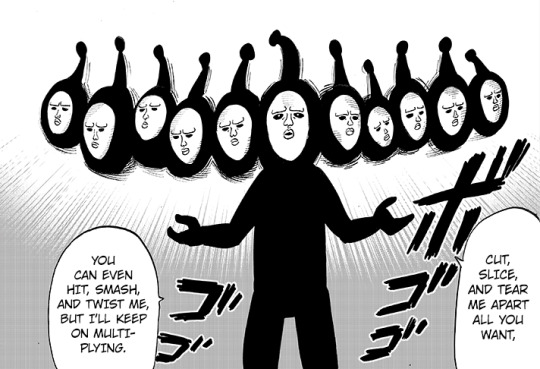
Yup, I keep cutting the words, but the bastards keep multiplying
The Story Itself
What I’d hoped for:
There’s a lot less of the monster of the week situation, this series. I love the care with which the Monster Association goes about attacking. What looked like random stuff (egregiously stretched out by the tournament), will come together to be a coherent and potent threat that will leave us viewers desperate to find out how the Hero Association replies.
[…]
And at the end of this season, even though we’ve had a very interesting time of it, none of it will be over. The stakes will have been delineated, the battle lines drawn and I really hope that J.C. Staff does enough to make it clear why we should care enough to come back for season 3 whenever it airs.
What we got:
No question about it, there’s a Monster Association and it’s pretty serious. We got their ultimatum to the Hero Association and there’s no question that they’re taking it seriously. The problem comes with the overall lack of energy and urgency in the treatment of the plot. We’re missing bodies, broken buildings, landed punches, follow through, all the things that sell that sense of urgency, of a situation that’s threatening to spin out of all control. Which is a pity, because then we don’t get the sense of relief once the monsters disappear, only to be replaced with foreboding as the Monster Association makes its demands.
They really can’t use time as an excuse for that. It was really bad scripting with a tendency to soft-soap all impacts by panning away at critical moments. It’s a real shame when episode 7 (19) is named ‘Class S Heroes’ – the heavy cavalry whom should turn the tides of battle – and we see very little of how they work. The rare times they have followed through with blows, the entire mood of the episode changes for the better.
It’s interesting that when chapter 84 was released, it felt like an excellent season finale. And it could have been, but for the lack of a build up in tension and urgency that should have been sustained all season long. So many missed opportunities – like little scenes of Atomic Samurai going in person to Bang’s dojo only to find it locked, more scenes of Bang hunting increasingly desperately for Garou, a running tally of heroes struck down by Garou adding pressure to his search… all sorts of things the manga has left wide open to be added to that would have created continuity and tension against the backdrop of a crisis that really, really needs the help of *every* hero.
Special note: Can I just say that Phoenixman is awesome in his garishness? He looks like a children’s show mascot put together by people on the last day of a ten-day bender. Guaranteed to give children nightmares. I love him.

Don’t believe the monster, kids
The Characters
Charanko: I wasn’t expecting anything of him, so honourable mention to him. I absolutely love the small but important addition J.C. Staff made to his story, whereby he came across Garou, heard and saw all the heroes the latter was beating up, and, despite his fear and knowledge of his weakness, went forward anyway. Fantastic!
Death Gatling: I’d been afraid that they’d undersell him. He wasn’t and I was very, very happy to see that. He’s ever inch as serious, tactically astute, and legitimately charismatic as he needs to be. They could have made Flashy Flash slightly more obnoxious to bring across the extent to which he felt slighted but that’s minor.
Looking at how fans took him, I’ve been a bit disappointed in the number of fans who don’t get that he’s far from wrong both in seeking recognition (although he did pick the wrong target to make an example of), and for not believing Garou, but that’s not a critique of the way he’s been presented. The thorny issue of recognition is something I’ve been mooting a meta on, but another day!
Garou: What I’d hoped for
I want to see the story of how Garou grows from a malcontent and apparent crazy to this juggernaut whose appointment with destiny cannot be stopped.
What we got:
I’d say this was fulfilled! His luck and unstoppable destiny come across well. I really like his relationship with Tareo and with Bang being expanded on.
Fans definitely have taken Garou to heart with very few people neutral on him. I appreciate the fans who correctly point out that he’s incoherent and hurting heroes who have done nothing to him on account of the childhood trauma he’s projecting onto them. Like him or not, he’s definitely been given the space he needed and it’s going to be very interesting to see how people change their views of him as the anime continues.
King: What I’d hoped for
I want to see King be exposed as a fraud and a coward who runs from danger and leaves people to die, then redeem himself as a decent human being and become the fraud and coward who stands before danger so people might live. That’s huge – he’s been running like a rabbit for years.
What we got:
Fulfilled. I love how his relationship with Saitama unfolded, pretty much note perfect. The scene of his wiling himself to courage is great; it and the flashback JC Staff added linked back to to where he started out quite nicely.
Who doesn’t love King? I suspect he arm-wrestled Mumen Rider for fan favourite, particularly as he’s so very ordinary a man in a world of demi-gods.
Saitama: What I’d hoped for
We see Saitama finally make a friend, get resolution as to why the world ignores him, and get to celebrate his progress, even as we learn how deep his sense of alienation goes. I love how it’s going to start with Saitama walking away from his disciple and end with Saitama running for his disciple and how nothing else mattered until he saw him safe and well.
What we got:
Mostly fulfilled. His stasis and ongoing dissatisfaction with life come across excellently. His feeling ever more irrelevant and removed from the flow of life is literally and metaphorically on show, even as we get to witness the life-changing impact of his punches on others.
Folk missed Saitama sorely, which is as it should be. JCStaff, bless their lily-livers, really did miss a trick in not having Elder Centipede continue disintegrating for several seconds – after having been parched for Saitama, that ludicrous scene really helped.
Genos (why always you, my friend?): What I’d hoped for
Last series, we saw Genos try and lose, try and lose, try and lose, try and lose yet again. This season, from the very first episode to the very last, we watch that process of change from a failing hero to a truly fearsome one fit to rub shoulders with the best of heroes. I want to see how it thrills us, entertains us, breaks our hearts and maybe we dare to hope for even crazier heights in the future.
What we got:
Hm. Let me paraphrase Dr Bofoi here: ‘It takes a special sort of stupidity to mess up this badly’. This is worth unpacking a bit as when things go wrong, we often get a better opportunity to see what makes them work. And I’m always interested in what makes communicating ideas effective.
For once, let’s start with fan reactions. The actions Genos takes on the screen are pretty much the same as in the manga (a little abridged in places, but more or less the same). After manga chapter 84, you got reactions like this: ‘ Genos from now on to me will no longer be a joke. He’s earned my respect.’ ‘…if he still had a human body, he’d have broken his limiter by now…’, ‘he really stepped up’, etc. After episode 12: it’s ‘oh, everyone can beat Genos’ 'he’s like a princess in distress’ 'he’s lucky that Garou wasn’t at full health’… ‘…that man has felt useless since when he first met Saitama during the mosquito fight…’
Manga readers are less scathing than anime only viewers, but they have the benefit of the manga and aren’t reacting to what’s actually presented on screen. Where the anime has made the case for Genos being awesome, as it did in episode 11 (23), fan reactions followed appropriately.
Interesting. How the hell did JC Staff create the diametric opposite reaction of the one Murata and ONE had elicited? Particularly when they made a decent fist of the other characters?
From the beginning, I’d worried most about Genos – the clumsy, lifeless sequences we saw of him in the PV inspired no confidence. With Genos both opening and closing out the season, they really needed to get him right to set the correct tone and leave the right taste in the audiences’ mouths. JCStaff have struggled most with his portrayal, both in visuals and action, although it came together nicely in episode 11 (23). Mostly, it’s Ishikawa’s sterling voice acting that has carried the character all season.
And then they silenced Ishikawa. A mix of stupid-lazy-desperate-for-time meant that for the last episode, they cut out all of Genos’s POV regarding how uneasy he still felt about the monstrous presence he couldn’t pin down, his shrewdly wondering how to find their headquarters, his initial assessment of the Elder Centipede and even how very carefully he thought before deciding to take action. They thought his amazing actions could speak for themselves. They were wrong.
It’s like having Garou act without benefit of flashbacks and assuming his actions will speak for themselves. They don’t! Without the benefit of our knowledge of his motivations and thoughts, he really is just a thug launching unprovoked attacks on heroes.
Instead of us seeing and understanding that Genos had learned, was thinking carefully on all he’d been told and the drastic action he took was because he’d weighed up the options and realised only someone sacrificing his life would save the others, we got the opposite. So what they created instead was a guy who wouldn’t listen to repeated good advice, took on a too-strong enemy and got his butt kicked. Again. And if there’s anything fans rightly hate, it’s a fool who won’t learn. As I pointed out earlier, Genos opened and closed the season – so the impression that nothing had changed really took a lot of any climactic feel out of the episode.
The title of the final episode didn’t help either. Instead of translating it as ‘taking responsibility for one’s disciple’ which would apply with equal force to both Bang trying to bring Garou to heel and to Saitama, rushing in to deal with a situation Genos couldn’t deal with, Crunchyroll went with the near-literal ‘cleaning up the disciple’s mess’ and Hulu with the literal ‘wiping the disciple’s butt’. Both of which set the viewer to see whatever Genos did as a mistake. Even though, ironically, he didn’t make any this episode. It’s a translation klutz like finding out that someone has translated the English idiom ‘catching Peter’s eye’ as ‘gouging out Peter’s eye’ instead of ‘being noticed by Peter’ (no Peters were harmed in the making of this sentence). That is out of JCStaff’s hands, but I hope that whoever does the DVD/Blu Ray has a better set of translators available.
Ah, it’s not worthwhile grousing. It’s not like they had the time to watch the finished episode back and consider the story they were actually telling. I don’t envy whoever takes up season 3. They have a lot of extra work to do to change viewers’ impression of the character and the source material isn’t going to help them. It's going to br difficult to explain why, when faced with a fool who won't listen to him and appears intent on self-destruction, Dr Kuseno would hand Genos an outfit that needs the most careful judgement to use with any degree of safety. For manga readers, it makes sense. For anime watchers some heavy duty retconning will be necessary.
While ONE cried tears of joy after reading Chapter 84, if he’s crying any tears after this season, they won’t be happy ones.
#opm#anime#season 2#review#characters#story#please DON'T come back JCStaff#they didn't entirely suck#but they sucked too much to be entrusted with more#dodgy visuals can be redrawn#ropey sound can be remastered#but missing the point of major characters argh#that and poor scripting throughout
29 notes
·
View notes
Text
Day 18: “Secrets? I love secrets!”

Fandom: Destiny
Pairing: Zavala/Female Guardian
Warnings: mild sexual content, alcohol use, one unhappy, over-bribed Lilith
-/
Miyu belches by way of greeting, Shaxx whacks her on the back with a thick hand, and they both laugh heartily. "Sid'down, Lillie," She gestures to the empty seat beside her with a slosh of her mug. "Nightss only getting started."
Lilith-2 almost wonders for a moment if she's going to blow a bulb in her optics. This is not the strict, gentle teacher she trains with nearly every morning. This warlock is flushed with a pretty blush, doe-eyed and flailing wildly for Lilith to join her.
Miyu is plastered.
This is going to be so much fun, Lilith thinks.
(And it is, until it really, really isn't.)
-/
"When I was her age-"
"No," Miyu looks like she's slapped Shaxx, but it's very unlikely he's even felt it. Or, if he did, he likely enjoyed it. Lilith can't tell. "Don' finish that. You're a bad influence."
"Bad influence?!" Shaxx bellows in Miyu's face. "I'm a bad influence? You've drank half the bloody bar dry and I'm the bad influence?"
"You're not recounting the Dark Ages to my protege," Miyu snips back, lips plump and pouting in full force.
"Just because you were lost for half of it-"
"Ignore him," Miyu says, slinging an arm around Lilith's shoulders. "Do you need another drink?"
"Still good," She chirps, having never fully recovered from her first social outing. She'd meant to meet Bertie here for dinner and a drink, but he'd gotten caught up on patrol with a new Titan. Was just as well. This was fantastic entertainment, and she wasn't very hungry, anyway.
"You don't need to hold back on my account," Lilith watches Miyu swing her feet - the stool is too high for them to touch the ground - and hum idly. She waves down the bartender for another drink and elbows Shaxx when he focuses too hard on a Crucible replay, mouthing his own commentary.
"Please. At this stage," Shaxx covers both of Miyu's ears with his monstrous hands, but she's too concerned with the frothing ale placed before her to stop with the giddy smile, "She doesn't have a filter." He removes his hands. Miyu is still happily glugging her drink, "Zavala has another thing coming if he thinks I'm taking her home."
"Z'vala?!" she turns and looks over her shoulder, lip curling outward. "Aww, I thou' he wuss here," She slurs. "Damn." She very earnestly informs them both, "I love him. He's incredible," And then sighs like a teenager with a crush.
"You're a terror. He puts up with so much."
"He does not!" Miyu glowers at Shaxx and he cackles. She rounds on Lilith, who covers her mouth with both hands. "Don't you dare," She pokes Lilith in the chest, "Yer s'posed t'be on my side!"
That does make Lilith laugh, and she accepts a high five from Shaxx for it that night have shattered her hand. Nizana, her Ghost, runs an internal scan. Seems he's shorted out her neural sensors on impact, but everything is fine.
"He doesn't mind. I'm a cute drunk," She insists, hiccoughing once, with a petite shudder. "Makes me seem younger."
"You are too much," Shaxx agrees, clinking his mug to hers. "I'll drink to that."
"How good're you at keeping secrets?" She nudges Lilith, some time later.
"Secrets? I love secrets." Lilith makes an x over her chest plates, where a heart would be.
"Zavala. I'm like, phoo," She leans back, swaying as if her mind is blown by the idea. "I'm centuries older than him and he has no idea."
Lilith tilts her head. "Really?"
"Uh huh. He's so sweet, calling himself 'Old Man' like he's not a baby himself. This oaf, too." Miyu elbows him as punctuation for her words. "He's alright once y'get pass' the yell-y parts."
"Quit elbowing me, woman!"
-/
The next day, Lilith wakes up to find out her morning training session is cancelled. No surprise there. She dresses, gets ready, and heads into the Tower, ready to throw herself into something that will make up for the lack of structured activity this morning.
Shaxx is irritated - she understands it as hungover - and louder than usual. Arcite is humming the song they'd been singing when Zavala arrived after his shift to take Miyu home. Talk about irony, Lilith thinks.
She doesn't want to poke the metaphorical bear, so she trudges quietly over to Zavala's post.
He does not turn from his viewpoint over the City but acknowledges her approach. "Guardian."
Lilith's reply is equally as neutral. "Commander." She waits for a beat and when he does not reply she asks, "Do you have any ops or patrols I could do? My morning appointment was… uh, cancelled."
"Ah," He muses, a hint of amusement hinted in his voice. "My breakfast plans were… dashed, as well," He shares with something like amused exasperation. "I could find something for you, if you'd like. Any preference on location?"
She shrugs. "Didn't know you have people a choice," She concedes.
"I do not, usually. However," Zavala regards her with that serious blue stare, "I require information and am willing to barter for it."
"Commander?"
"Miyu said she told you a secret, last night. She would not divulge the nature of it, but challenged me to figure it out on my own."
Lilith gulps. She should have risked going into the Crucible. Hungover Shaxx seems a hell of a lot safer than an inquisitive Zavala.
The man in question lifts his chin, his eyebrows doing this strange lift and drop whilst he tucks his hands behind his back. Without a hint of foreboding - somehow, that makes Lilith even more frightened - he apprises her.
"And you are going to tell me."
-/
Four patrols in the EDZ later, he comes across the comms for her specifically.
“Nizana, don’t answer that.”
“I know. I pinged back our coordinates and said we were in the middle of a firefight.”
Lilith creates a grenade in the palm of her hands, solar energy blazing across her gloves. She throws it into a nearby cave, and picks off the Cabal that come rocketing out of it.
-/
“Sir, I can’t tell you. Miyu swore me to secrecy.”
He paces before her, but it’s not anxious to anyone but the Exo left to watch him contemplate in motion.
“Is it related to her Light?”
“No.”
“The Dreaming City?”
“No.”
“Drinking?”
“No.”
“Why wouldn’t she tell me?”
“Maybe she’s embarrassed?”
“Of what?” Zavala inquires so innocently that Lilith almost answers.
“Oh-noooo. Commander, come onnn,” She whines. “This is mean. Miyu is my teacher.”
“And I am your Commander.”
Lilith, having nothing left to lose, flips a switch. “How does that work, anyway? If she’s seeing you and you live together, isn’t that a conflict of interest?”
“Alright,” He hedges, unsettled. “Dismissed.”
The Exo doesn’t waste her time, escaping while she has the chance. “Oh, thank the Traveler.”
-/
Miyu guides her through the first four stances of a new set - Lilith had been begging to expand her repertoire - and watches as she flounders the fifth. Her teacher’s diamond eyes follow her line of sight up to a watching Zavala, who is studying Lilith intently.
“Leave her alone,” Miyu calls up to him. “This is my time and you’re making her uncomfortable.”
“You could tell me yourself.”
“Not in this life or the next, Anata. Now shoo,” She waves him off with a suggestive smile, threatening, “Or I’ll tell her another secret about something you really won’t want me sharing.”
Zavala leaves immediately.
“I don’t actually know what I told you,” Miyu admits softly, apologetic. “I was really drunk. Hopefully it was something juicy.”
“You don’t remember?!” Lilith screeches. “You are the worst drunk in the history of drinking!”
“Says the Exo who crashed on her Commander’s couch the first time she touched a pint of ale.”
“Ooooh, you’re mean. I should tell him for that.”
“You really, really shouldn’t,” Miyu says, and produces a new sword. “Give it a spin. If you like it, you can keep it.”
Lilith doesn’t look convinced. “You’re bribing me?”
Miyu shrugs, saying softly, “He’s withholding sex. I need leverage.”
“I did not need to know that.” She blinks back at Miyu. "If you don't remember, why-"
"Pride. And also he's so cute when he's focused. And his jaw does the thing."
"The thing?"
"The thing," Miyu confirms. Lilith doesn't get it. "Ugh, nevermind."
-/
At the end of her wits, Lilith throws open the door to Zavala’s office, letting it bounce off the wall. She throws him a scathing glance at having been summoned for the twenty-seventh time this week. “Shaxx also knows. Miyu gave me a sword and I’d like to keep it. Go ask him.”
Zavala considers. “He won’t tell me, I’ve already asked.”
“What does she have on him?” Lilith flaps her arms, exasperated.
“Apparently they go way back,” Zavala says, with a roll of his eyes.
Lilith freezes.
“That’s a clue,” Zavala reasons, immediately. His eyes widen, then narrow intently.
Lilith smirks. “You got it from Shaxx, not me.”
The Commander nods. “Indeed.”
-/
“The next time someone tells me a secret,” Lilith tells Bertie, laying in a field of redgrass near a Vexmilk stream on Nessus, “I’m going to tell the first person I see. I’m done with this. She throws her new sword into the stream and doesn’t look back.
Nizana scoffs. “Good riddance.”
-/
“Ikora, how does one escape a difficult situation?”
“By making a choice.” She narrows her golden irises on Lilith. “Is this about the secret?”
“You know about it, too?”
Ikora harrumphs. “I know everything that happens in this Tower.”
“So you know that Miyu gave me a sword-”
Nod.
“Because Zavala is-”
“Unfortunately so.”
“Would you please just tell him? He won’t leave me alone.”
The Warlock Vanguard sighs. “I did tell him.” She crosses her arms. “Several times, in fact. He does not believe me.”
“You’re kidding.”
“I am not.” Ikora smiles.
Everyone wants to see Lilith suffer, it seems.
-/
“No. Absolutely not.”
“Guardian?” Kadi looks at Lilith with a blink, the postmaster terribly confused. “But-”
“I’m sorry,” Lilith shakes her head. “Throw it all away.”
The post frame takes a moment to process, then tries again. “For Guardian Lilith, from Commander Zavala. Very nice man.”
“You’ve never been on the receiving end of him when you’ve got classified information. Return to sender, Kadi. Please.”
“But Guardian, it’s busy.”
“I’m sorry, but this is just out of control. You can give that gun to the next warlock you see, okay?"
-/
Half a week later Lilith slams the door shut behind her, causing a rather comical reaction. Miyu is paused, drink - it better not be alcohol, Lilith thinks - just shy of her lips, and Zavala's eyes narrow in thinly veiled irritation.
"You interrupted my dinner, so I'm interrupting yours."
"I have to be in Command in half an hour for a strike operation. I do not have time for-"
Lilith smacks her fist on the table, leaning forward, bellowing at him, "You interrupted my dinner, called for me sixty two times-"
"Seventy one," Lilith's Ghost interjects.
"And you've been making me out to be the biggest jerk to the postmaster. No more gifts. No more favors, no more secrets." She looks to Miyu. "Ikora said she'll teach me to be a Voidwalker, and Shaxx said he'll teach me swordplay. I'm this close-" Lilith holds up two pinched fingers to use as a meter, looking between them, "To taking them up on it!"
"Easy, Lillie."
Lilith snarls, waving her hands. "Oh no. You don't even remember it! I can't believe you!"
Zavala stares at Miyu in shock. Miyu flushes. "What?" He snaps.
Miyu flushes and shrugs. “I had a lot to drink?” She reminds them, sheepishly.
Lilith makes a flapping, exasperated gesture, and finally caves. "Look. She's older than you. By a lot. Apparently she feels younger when she drinks away her brain cells, and thinks you're cute thinking you're all old because she's like twice your age."
Miyu tilts her head. She and Zavala share a glance before he speaks. "This is a blatant fallacy, Lilith. She's pulling your le-"
One eyebrow goes up in a bold impersonation of the Commander's signature eyebrow raise.
"No," He says, scandalized.
"Yes," Miyu confirms.
“That’s impossible.”
"Not at all,” Miyu shrugs. “Lilith?"
The younger Warlock takes a heaving, exhausted, aggravated breath. "Yeah?"
"I'll take it from here. Training in the morning. Don't be late."
"Don't go out drinking," She throws back, petulant. Miyu doesn't spare her a glance. They both know the other will be there.
"Go collect all that stuff from your postmaster. It you don't want those robes, I'll take them back. He tried bribing me with them first and they’re really nice." She winks.
Zavala glowers at Miyu, but he doesn’t deny it.
"For Light's sake," The Exo grumbles, rolling her optics so hard she fears they might pop out from the strain. "I'm keeping them now, for sure."
#Destiny Fanfiction#Fictober 2019#Commander Zavala#Zavala x OC#oc: Miyu#oc: Lilith#miyu the sweet bean warlock
6 notes
·
View notes
Text
Today I rewatched 1.03, 1.04, and 1.05 on the tnt loop, and the Big Themes of s14 are still going strong. We’re learning more about the Winchesters, their relationship to one another, and watching as they confront a lot of monstrous things for the first time (or at least confronting them for the first time on their own without John).
Sam and Dean are in the process of really getting to know each other as adults. Sam has been out of hunting for years, and had no intention of going back to it until Jessica’s death pushed him into the Revenge Plot that had fueled all the horror of their entire lives since Mary’s death. I mean, this was bad enough when we just blamed demons and Lucifer for this in s5, but after 14.20? This is worse by at least a magnitude of 10. :P
The boys are just learning to navigate their relationship now that Sam is an adult, and not through the dynamic of Dean serving as his parental figure (even when Dean was a child himself). It’s hard for them to break from these patterns, and to recognize that their old perceptions of one another might not be as accurate as they always believed.
Having watched Dean grow in a parental relationship with Jack in s14, it’s rather shocking to see Sam question and mock Dean’s interest in the boy Lucas in 1.03, insisting Dean’s playing some sort of game with the intent of flirting with his mother, and have his eyes opened by just how good Dean is at talking to a kid. Sam can be forgiven for not recognizing Dean’s parental skills, because to him, he always figured that was just “big brother skills.” He expected Dean to behave in his usual surface-layer fashion of hitting on hot women, and instead saw pretty deep into Dean’s own trauma from the night their mother was killed. To Sam, Mary wasn’t even a memory, just a string of rose-tinted stories from his childhood that John and Dean didn’t talk about much. Now in s14, those illusions are long gone, but other illusions still remain.
1.04 is just hilarious for how inexperienced Sam and Dean BOTH are. They’re deeply shaken by Specky the One Trick Wonderdemon-- and putting Dean on a plane when he’s terrified of flying is the least of their problems. Sam never even knew this fact about his brother, though, so we’re also being invited to wonder just how much Sam actually does know about Dean and what really makes him tick. There’s so much of their lives that have been shadowed in secrets-- which becomes even clearer in 1.05.
Bloody Mary, even the title reminds us of the trauma that’s been the shocker highlight of every episode’s cold open so far: Mary, bloody, burning on the ceiling. But the ghost in this case’s MO-- killing people who bear secret guilt for someone else’s death-- is still a HUGE theme in the show.
Sam and Dean are keeping a lot of secrets from one another (surprise, right?). They’ve gotten a lot better about being honest with each other, but even in s14 they bear guilt and harbor secrets that end up hurting each other. But overall they’ve made HUGE strides toward being more honest with one another.
The other incredible metaphor in this episode is all the mirrors, since so much of s14′s storytelling happens through narrative mirrors. Sam having to look into a literal mirror and face himself in the reflection of the vengeful spirit inhabiting it...
SAM: The way Mary's choosing her victims, it seems like there's a pattern.
DEAN: I know, I was thinking the Same thing.
SAM: With mister Shoemaker and Jill's hit and run.
DEAN: Both had secrets where people died.
SAM: Right. I mean there's a lot of folklore about mirrors-that they reveal all your lies, all your secrets, that they're a true reflection of your soul, which is why it's bad luck to break them.
DEAN: Right, right. So maybe if you've got a secret, I mean like a really nasty one where someone died, then Mary sees it, and punishes you for it.
SAM: Whether you're the one that summoned her or not.
And it’s Sam’s secrets he’s keeping from Dean that even enable them to solve this case-- by literally shattering the mirrors. So as awful as it is, and as much distance and mistrust as it engenders between Sam and Dean, also demonstrating the huge gulf of distance between them spanning so much more than the years away from each other while Sam went to Stanford and pretended his entire life to that point didn’t really exist, that he was just a normal guy like everyone else. And at the end of the episode, Dean’s still entirely in the dark about Sam’s prophetic dreams.
By contrast, Sam being Truth Spelled into confessing his favorite singer is Celine Dion, and spilling all of Dean’s inner nerdliness in 14.20 seems wildly tame, you know? Back in the early days, these guys barely knew each other at all, at least not in any significant way that really mattered. S1 was the journey of them learning how to even trust each other beyond having each other’s backs on a hunt in a life and death situation.
Meanwhile John remains a mysterious figure who’s motivating their entire search for the truth, while Sam grows more and more impatient with discovering the truth about what killed Jessica now that he’s been handed a revenge mission identical to his father’s. This is like the first iteration of the As Above, So Below theme that became key to the Apocalypse Era-- of the archangels needed specific vessels born to mirror the Heavenly Conflict through their own lives. And it started out by telling the story of John and Mary through their own son. By s14, it’s been mirrored out to every level of the story, and through every possible alternate universe. And heck... it’s all right here in acorn form.
Gosh they’ve come so far, even while these themes evolved right along with them.
#spn 14.20#spn 1.03#spn 1.04#spn 1.05#it's spirals all the way down#lies and damn lies#winchester family dynamics#performing dean#s14 hellatus rewatch#spiders georg of the tnt loop
21 notes
·
View notes
Text
BEHIND THE SCREEN: GM Prep for Deliverance, OH (Mystery 1)
Thank you so much to everyone who left a review of our show in February! I’m so excited to be able to share my GM notes and a little bit about how I prep for our sessions with all of you, which are contained in quite a long post beow, and I’m more than happy to answer any questions that come up, so send them my way and I’ll get to them as soon as I can!
Fair warning: this post contains spoilers for... the entire first eight episodes of Deliverance, OH, quite literally, so if you haven’t finished listening to the first arc, it’d serve you best to listen to episodes 00-08 before reading my notes. I don’t think there will be any other spoilers for future episodes, but if there are I’ll be sure to mark them with plenty of space for you to stop or skip reading them.
Thanks again for your support, and enjoy this little walk through my brain on Monster of the Week!
-Christine
ORGANIZATION
I do the majority of my GM prep for this game in one big google doc I call “Session Outlines” which I store in a folder that has all of my worldbuilding notes, monster ideas, intro scripts, alternate playbooks, etc. I like having everything in one place so I can cross-reference with old arc while I work and on the fly, and this is as close to organized as I get.
The “Session Outlines” document’s got a handy table of contents with links that I can follow to quickly get where I need -- the breakdown is based on the Mystery prep system that Monster of the Week gives, so each arc has it’s concept, hook, monster, minions, bystanders, locations, and countdown. I’m going to go through each of those, but this is what the outline/table of contents looks like on the first page of my doc:

As you can see, I give each arc a catchy, stupid name that no one else ever sees, just to entertain myself.
Also in this doc, right at the end, I have the countdowns for various long-term arcs so that I can reference them when those intersect with things happening in smaller mysteries:

I’ll get a little deeper into countdowns further on in the post for anyone who hasn’t run Monster of the Week before, because they’re my absolute favorite part of prepping for this game.
PRE-MYSTERY PREP
Now, the first mystery in Deliverance was the first time I’d ever run Monster of the Week, so there are some aspects of prep that I’ve altered a little as I’ve learned more, but let’s just go through each page of my original notes from that arc.
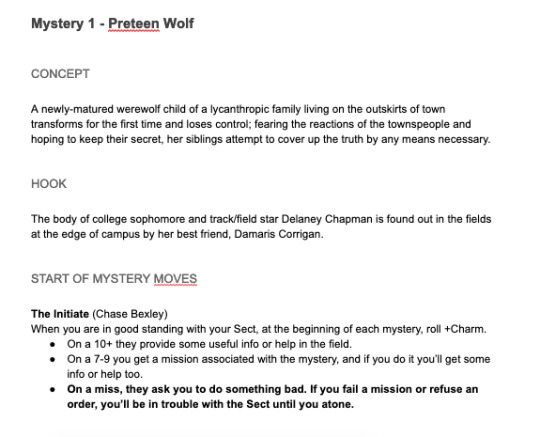
The first page of my notes is always where I put the high-level thematic stuff that I want going on. The Concept for the arc -- in this case, a complicated question of morality, responsibility, and control that comes up when you find out that the monster that’s killing people is just a kid that doesn’t really know any better. I knew that with this arc I wanted to immediately set up the season with the question of: can we say that a monster is intrinsically evil, and if they are not, how does that effect our moral responsibility in re: trying to stop/hunt them?
Some of that came from my own agenda coming into the game, and some of that came from our episode 0, with Andrew flagging an interest in this strict anti-monster sect with rigid morals and absolute obedience, and also with Roman flagging an interesting in the nature and morality of monstrosity by choosing the Monstrous playbook. I figured a question like this would instantly give them both a strong agenda, and build an interesting tension between two of the four main characters if I could get them to butt heads about it.
The hook is pretty straightforward: what direct action or effect of the monster’s presence are they going to notice first, what’s our “opening shot” so to speak. I’ve been reading the essay collection Dead Girls by Alice Bolin lately and feeling guilty about having killed Delaney off before she was ever even on screen, but at the time I chose what felt like a trope-y establishing shot for the season so that it would become very quickly apparent where I was attempting to turn certain other tropes on their head. Anyway, someday we’ll be returning to Deliverance again and all I can say is that we may or may not have seen the last of Delaney Chapman... but that’s all stuff for later.
I also always put Chase’s start of mystery move on the first page of each mystery’s notes for a few reasons -- mostly so I don’t forget to ask him to roll it, but also because his result will, in part, develop the tone that mystery’s going to have. If he rolls a 10, this is going to be a mystery where the Kindred is working closely to solve the same problem, but if he rolls a 9 or below, the group is going to be more splintered, he’ll have fewer resources on hand, and on a 6 or below, they’re going to be actively obstructing him in some way. In play, I bold the result he rolls on this page so that I don’t forget, weeks and weeks later when we’re recording the third session in the mystery, what it was that he rolled, and so I can look back later and remember the progression of his relationship with the sect.
Anyway, after all of that’s set in place, I move on to firming up the details of the monster -- powers, attacks, weaknesses, all of that good stuff. Most important is the MONSTER TYPE, which is one of my favorite things about Monster of the Week.
For anyone who hasn’t taken a look at the Keeper preparation sheets for Monster of the Week ( HERE! ) I’ll put in a screenshot of what I’m talking about so that it makes sense.

The first thing I do in creating each monster is pick its type/motivation. Some of them are really obvious, but sometimes having the opportunity to pick an unexpected or non-traditional motivation for a traditional monsters is even better. I’ll elaborate more on that some day when I do one of these posts for a later mystery, because Clara is pretty straightforward in terms of monster type. Here are her full stats:
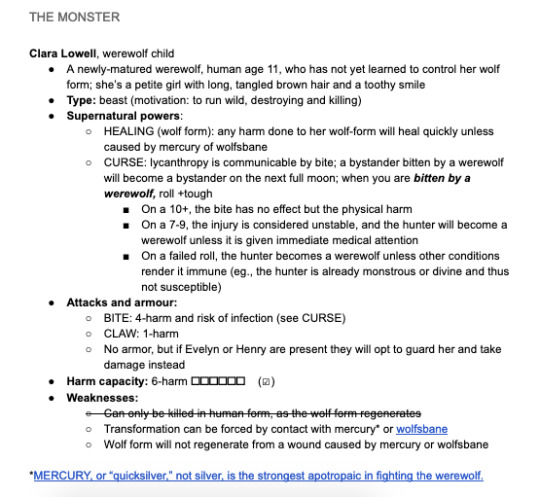
Now-- I’ll admit, at the end of the day Clara maybe wasn’t the monster in this arc. I went back and forth a lot on how to frame this arc in terms of monsters and minions, because the crew was never actually meant to fight or kill this kid. But, again, I was so interested in setting them up immediately against someone that made them question their internal concept of “monster” that I went with it. She was for me, ultimately, the central focus of the arc: the cause of the conflict, the motivation for the other involved characters, etc., even if she didn’t end up being the climactic conflict of the whole arc.
Clara didn’t appear on screen nearly as much as I expected her to: I’m not sure I ever got as far as her physical description as written here. I picked her type as BEAST because, in her uncontrollable werewolf form, that was what she would do -- so if they hurt her, and she transformed in response to that injury, that was what she’d do.
I also write this neat custom move for werewolf bites, but then none of the PCs got bitten by anyone. Still, I stand by the possibility of time-pressure and tension inherent in that 7-9 option.
As for weaknesses, my understanding of the werewolf healing process changed a little bit in play as I started to describe it happening to Evelyn, so between sessions I crossed out the original idea. I honestly have no idea, in retrospect, where I was going with the second bullet point, but thus is the fun of digital ephemera, it still lives in this google doc even though I have clearly ignored it for the rest of forever.
That link about mercury, for the record, goes to an instructables page I found for “how to kill a werewolf” -- Andrew still gets mad at me that “quick silver” not being literal is the reason he has to clarify whether anything I say is a metaphor or literal, but I thought it was way more interesting than Chase’s already having the perfect weapon (his silver knife) on hand.
Minions are up next:

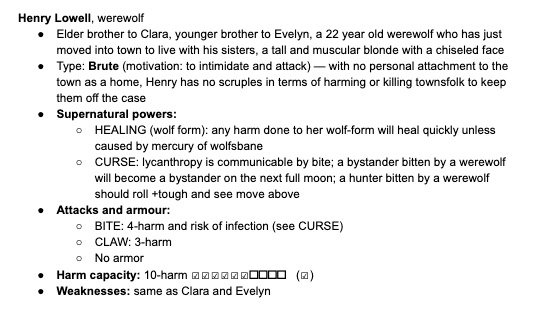
As you can see, most of the heavy lifting here was in picking their Bystander Types since all three of them were werewolves with basically the same ability. I even copy and pasted from Clara to the point where I forgot to change the pronouns in Henry’s “supernatural powers” section. You can also see the little copy-and-paste checkboxes I use to represent harm on Henry’s stats -- there was so much happening at the end of that battle that I never fully caught up with filling those checkboxes in, and I think I also had them in my paper notes (which we’ll talk about later in this post).
The big motivation here was to differentiate Evelyn and Henry as two sides of the coin: both doing “bad” things to protect their sister, but going about them in different ways, with Evelyn -- who has an investment in this town, a life here she needs to protect in addition to protecting her sister -- being subtle, less destructive, really focused on protecting more than on doing whatever it takes, where Henry -- who has just moved back, and has no attachment to Deliverance itself except his family -- was going to do anything it took to get people off Clara’s scent, killing anyone who got suspicious.
You can see that I’ve face-cast Evelyn, here -- I do this for maybe 25-30% of the NPCs I make for this show, either ones I think are going to be particularly important or ones where an image of them just immediately comes to mind. In addition to Evelyn, I think I have actors in mind for Damaris, Van, Larkin, Blanche... Maybe that’s it? I also originally had one for Remedy (blonde Zoe Kravitz) but some incredible fanart has swayed me to having at least 3 different mental images of Remedy.
I should note that my actual writing process for these notes is not in the order they appear in the doc: at this point, I usually try to at least sketch out the countdown because I’m in the mindset of thinking about the monster and what they’re going to do -- and then I fill in the bystander and location details to suit the countdown, making any adjustments to the countdown that I need to to accommodate new ideas.
But, in my notes Bystanders and Locations are next, so:
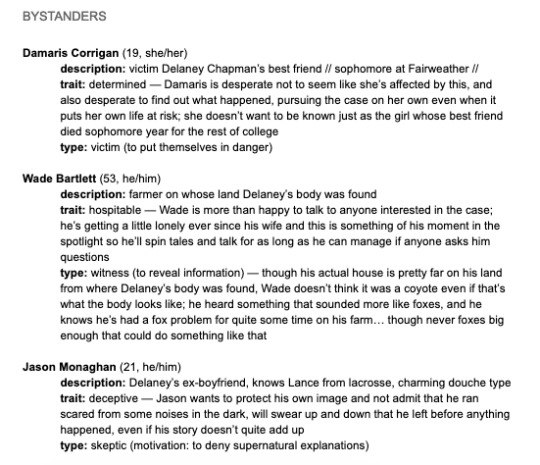

First thing of note: somehow, Sheriff Commander-Jones’ wife, the medical examiner, never made an appearance. She is just chilling in the background of this show, waiting for someone to need to talk to a coroner at the morgue, happily married to a very overwhelmed Sheriff. There are a ton of details here that never came up, and one of the things I learned from this first mystery is that I’d over-prepped the hell out of it. My bystander notes these days are a lot simpler: name, pronouns, age, brief physical description, type/motivation, and a one-word trait usually is about it.
(Melissa was going to be so good, I’m still so sad I’ve not found another way to bring her into things. Maybe someday...)
You can also see here the common symptom where I leave something (Yasumoto’s trait) blank to come back to and then instantly forget about it and it just stays blank forever. Also, I don’t know why the hell I wrote “charming” in Jason’s description. He was never truly meant to be charming.
I keep the little Keeper list of bystander types/motivations in the doc below all of my pre-made Bystanders in case I need to come up with some on the fly, but more often or not I forget to write them into the notes. Evidence: Remedy is missing from this document after I made her up on the fly when Chase needed healing.
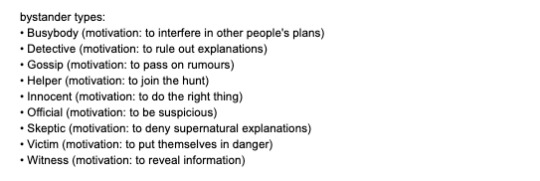
Locations are notoriously my least favorite part of prepping. I’m not good at coming up with interesting locations so I struggle through outlining the important places. I spent a lot more time on it with this arc than I do later on in the show, but my go-to is a few keywords describing the feeling/appearance of the place, and what information they might come across there.
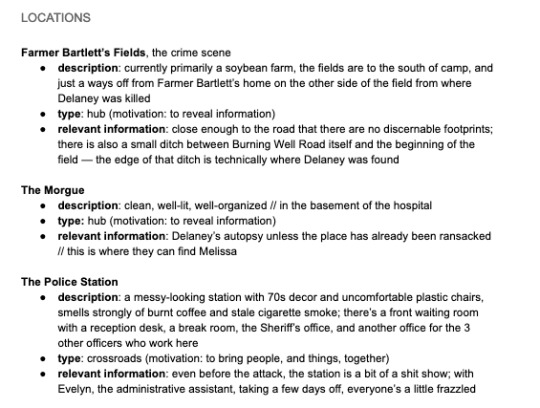

After that, we get to my favorite part of designing a mystery: the Countdown.
For those who haven’t read or run Monster of the Week, the Countdown basically represents the steps of what the monster would do if the hunters didn’t interfere, and it gives a sense of direction as to how things will progress. It’s broken up into 6 steps, and the story can move from step to step when the heroes take too long or fail rolls, etc. Here’s my countdown for the first mystery:

This one was super concrete compared to some of the ones I’ve written. A recent countdown ended “And then the world ends” or something like that, so this one was a nice, concentrated countdown for a first foray into the game.
I italicize countdown lines in my notes as they happen in play: when people stall for too long early on, or when they fail and I get to make an off-screen hard move. I think the shadows line here was activated when they took the time to take Chase back to the farmhouse to get healed, which meant they wouldn’t be able to find the information I had for them in the morgue. The rest of the countdown was altered by their decision to go after Evelyn -- because Evelyn couldn’t go after Damaris, Henry did, and thus didn’t go after the police.
I hang out on the Countdown page while we play, until I need to reference something else: it gives me a broad overview of where things are going to go, so switching back and forth between that and the list of Keeper moves on the Keeper reference sheet helps me improvise my responses to failed rolls and decide what’s going to happen as the characters go to specific place. I like keeping this focused outline of what the monster is trying to accomplish in the front of my brain at all times, because it makes it easier to decide what conflicts might arise and what threats are out and about.
The last section I prepare before we start the first session for the mystery is a broad mystery information section, which isn’t necessarily in the outline of Keeper prep that Monster of the Week provides. For some mysteries I use this a lot, for others it’s just a line or to, but it’s my catch-all space for any information I can’t fit anywhere else but think I might need.
In this case, it was both notes about werewolf transformations and also a sort of CSI-esque explanation of what had actually happened with Delaney and Jason the night before:

Again, most of this information didn’t get used -- and I’ve sense balanced out my over-prepping problem, but I almost always have something I want to remember that doesn’t fit in any of the other prep, so that’s what this section is for.
I think the biggest thing to note here is that a lot of this information is in flux: I’m always playing with what things will work, what things won’t, what will make for interesting decisions based on what the PCs are doing, and adjusting my information and planning from there. Less kill your darlings and more let go of cool ideas when better ones come up, but it’s all about being able to adapt on my feet when things aren’t going to plan. I try really hard not to imagine the full arc of the story and how I think it might go, because when I do they inevitably go in the opposite direction. My focus is more cementing the ideas and themes and questions I’m interested in so that I can find ways for those to come up no matter what the players decide to do.
Now, that’s all the prep that I do before the first session. But most of our mysteries for Deliverance take 3-4 recording sessions, so what do I do during and between?
DURING AND BETWEEN SESSIONS
During sessions, I tend to make notes on paper because it makes less noise while other people are talking than typing does (I am, as anyone will tell you, a notoriously loud typist), so write some brief notes from the session on a page for that session, and then another page of notes of whatever I’ve scrawled down immediately after we finish recording where I make note of where I want the next recording to begin -- what hooks there are for each character/group of characters, what needs to be addressed, what they’ve been in the middle of, etc.
I dug through the pile of papers I brought back with me when I moved back to the US this summer to find my scratch page notes for the first mystery (recorded August-October 2017), which are below -- a few handwritten, and one pre-game section that I decided to type because, if I remember correctly, I was making these notes during a lecture because I had procrastinated until the last minute. Major apologies for my oft-indecipherable handwriting; I’d translate, but most of the time I, too, have no idea what it says.
This one below was my post-session 1 notes, along with my general on-hand notes during the recording of the first mystery -- I’ve got harm checkboxes, Andrew’s description of the farmhouse for reference (which, admittedly, I have not looked at again until just now), and then some notes about where people are headed and what they’ve encountered and/or promised.
Looking back at those harm checkboxes, I think I nerfed Henry’s harm-count because I was pretty sure I was going to kill Chase if I didn’t. I was very much still getting the hang of how much harm monsters can do vs. how much harm hunters can do.

No, I don’t know what those numbers on the top are. I want to say that was Jason’s iPhone password?
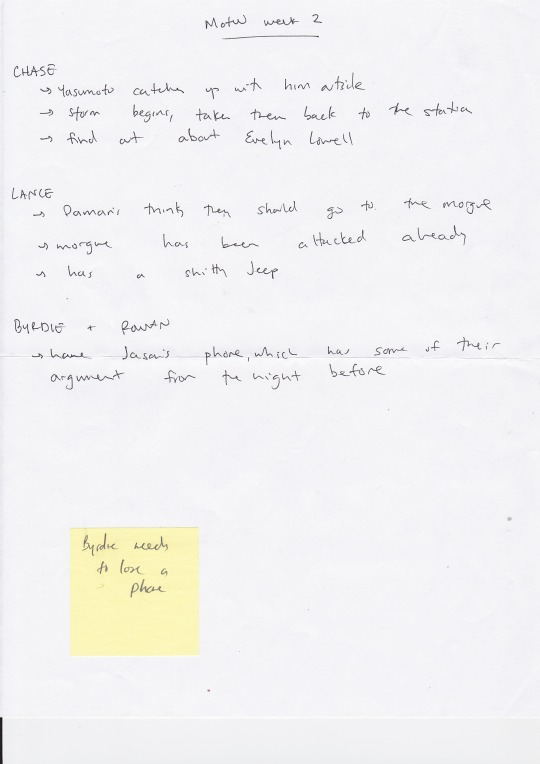
This one above is pretty typical for what my pre-session notes look like in the middle of a mystery -- each character or character group and then a quick note about where they are/what they’re going to be doing. This looks the most like the notes I take these days, now that I’ve been playing the game for a lot longer. They’re fairly sparse! Basically enough to give me an opening introduction as we start recording and then ask “what do you do?” and go off of whatever their answer to that is.
Another important note: much of this NEVER HAPPENS. “storm begins, takes them back to the station” who????? The quickest lesson I learned with this game is to not hold on to anything too tight because better things come up so quickly that you can’t afford to hesitate before abandoning ship and jumping to them.

As you can see, sometimes these notes are a “here’s what happened” or “here’s a thing you need to remember” note, sometimes they’re a “this is an interesting place to start” note, and sometimes they’re a “how the fuck am I going to get them back on track” note. Usually, I’d say, it’s that last one, with this particular group of characters. QUESTIONS are huge, in these notes -- “Where are you going now that Zeke’s kicked you out of the farmhouse?” is, I would say, the ideal kind of note for me to start off a session with.
Anyway, all that to say: for me, the real work of Monster of the Week is asking the right questions. Having a monster is important and having some idea of setting and bystanders is important, but if I had ten minutes to prep a Monster of the Week mystery, I would have: monster, countdown, and a strong hook, and I could probably improvise it all from there.
38 notes
·
View notes
Text
YBC Hot Takes: Just One Yesterday
Aaand we’re back around again, like a bad penny, representing the Fightin’ Foil Fedoras of the Peterick Institute of Hot Trashfire Takes on Fall Out Boy. We dive way too deep into our dumpster for an ass-pull out of Just One Yesterday and it’s happening today (which will be yesterday by the time you read this, probably).
Just One Yesterday: The Rot at the Core
Patrick is split, disjointed, divested from himself and susceptible to this Jekyll-and-Hyde (per)version of himself as he wanders, lost, through the tangle of media interviews, live performances, touring, and promo to support his solo career while the wolves (or Foxes, as the case may be) creep closer. He's pursued by predators--fans with their own axes to grind, vixens who want him under their control. Let’s dive into the dumpster below the cut, hmmm...
youtube
The freedom of Patrick's youthful start in Fall Out Boy--freedom from expectations, from limitations, from comparisons against others and especially his own younger self, is gone and he is at the mercy of those expectations and limitations and comparisons, no longer able to "start from nothing" as it were. In many ways, it's worse than starting from nothing and being nobody.
The serpent of doubt has laid him low, sliced him up, and scattered the pieces. His confidence has been poisoned by the poison-apple of knowledge. Knowledge of all those expectations, of how hard it is to be different, of how truly lucky they were the first time around.
The serpent finds the other parts of him in the same manner--his integrity as Andy just had to fight a hobo for a can of beans (how much selling out have I done just for scraps of sustenance), his creativity as Joe puts bloody handprints all over the domestic scenario, signifying how much of it Patrick internalized, because Houses Are Us in dreams and metaphor. (Plus, who knows how much of his bloodying he "brought home" to affect his life outside music).
The lyrics in Just One Yesterday have a significant layer of alignment to a “everyone is Patrick” interpretation here--Letting people down is my thing, find yourself a new gig, this town ain't big enough for two of us. I don't have the right name or the looks. Anything you say can and will be held against you. Only say my name. I'm bad news, I want to teach you a lesson.
There's a layer of Peterick in them (as there is in just about every single one of their songs) but remember that Pete writes, and Patrick interprets, arranges, and RE-arranges his words into something coherent and significant (and does so in as much of a vacuum as he can, as he's said, so that he and Pete don't "pollute" each other's contributions with what they each think the other is saying).
Patrick's arrangement of these words suggests his own internal turmoil about occupying the "hot mess" role in the dynamic, as if he should be able to pull himself together (literally on one level) or be impervious to the breakdowns or self-doubts. He throws Pete’s words at himself--Pete telling him that there’s only room for one hot mess in their dynamic, Patrick hearing that Hollywood has Pete and Patrick could only be a pale imitation of the glam of Pete.
But as one does, when lost in the woods, Patrick happens upon a friendly denizen in the form of Foxes, aka the "Death Adder" who is again the Serpent of Doubt, only this time, unlike the serpent his confidence has taken in and regurgitated, she wears the skin of a shapeshifter and hides her nature while driving him out of the woods.
And Serpents being what they are (among this, not at all good drivers with the lack of hands to put on steering wheels and all), the ride isn't as much of a help. While she sings the lyrics of betrayal (If I spilled my guts, the world would never look at you the same way. Now I'm here to give you all my love so I can watch your face as I take it all away).
"If the world knew how much of a fake you are, they would hate you. And I, your serpent of self-doubt, will prove that by bringing the fans out to love you, just so I can watch you crumple when they take that love away because you are Patrick on your own, and not Fall Out Boy.”
It is not an accident that while Patrick is careening out of control down the highway, his Confidence/Outer Self and Pete are both chasing after a kid (fan/innocence/youth), desperate to be helped, aided, accepted, loved, but instead coming off as a monster.
Driven by the Serpent of Doubt (literally!) Patrick still manages to reassemble his crew, the parts of himself that have lost their way. First up is Andy, his Integrity, who provides a helping hand to his Creativity in assisting Joe into the back of the pickup. And finally, Patrick's Confidence gets hauled into the back with the others, giving an exhausted, half-hearted flip-off to the world as if maybe Patrick can finally get his gumption back after the disappointment of the tour and the solo album's lackluster reception in the changing landscape of the music industry.
But Patrick made one significant mistake. He rebuilt himself but he failed to cut out the rot and expel the Serpent. His pieces are still in a vehicle (Patrick...PaTruck...too much?) driven by the Serpent of Doubt. And they all drank the (polluted) water that was in the back of the truck.
Patrick shared a grip with Andy/Integrity, and a meaningful Look of acknowledgment and recognition with Joe/Creativity, touchstones to be sure.
The only connection he makes with Pete/Confidence is after the Serpent returns to her true form and Patrick's enraged, pain-driven, monstrous form takes over.
4 notes
·
View notes